Reimagining the student experience

The Cat’s Meow
Capturing the essence of our vibrant student population would not be complete without a snapshot of the four-legged friends that play such meaningful roles in their lives – and, more-oftenthan-not, the very trajectory that led them to Penn Vet.
Whether offering a respite from hours of studying or bringing smiles to the faces of anyone who crosses their paths – including Bellwether’s own editorial team – pet-pals like Nugget, owned by Alexis Massey, V’26, are quintessential to the Penn Vet experience.
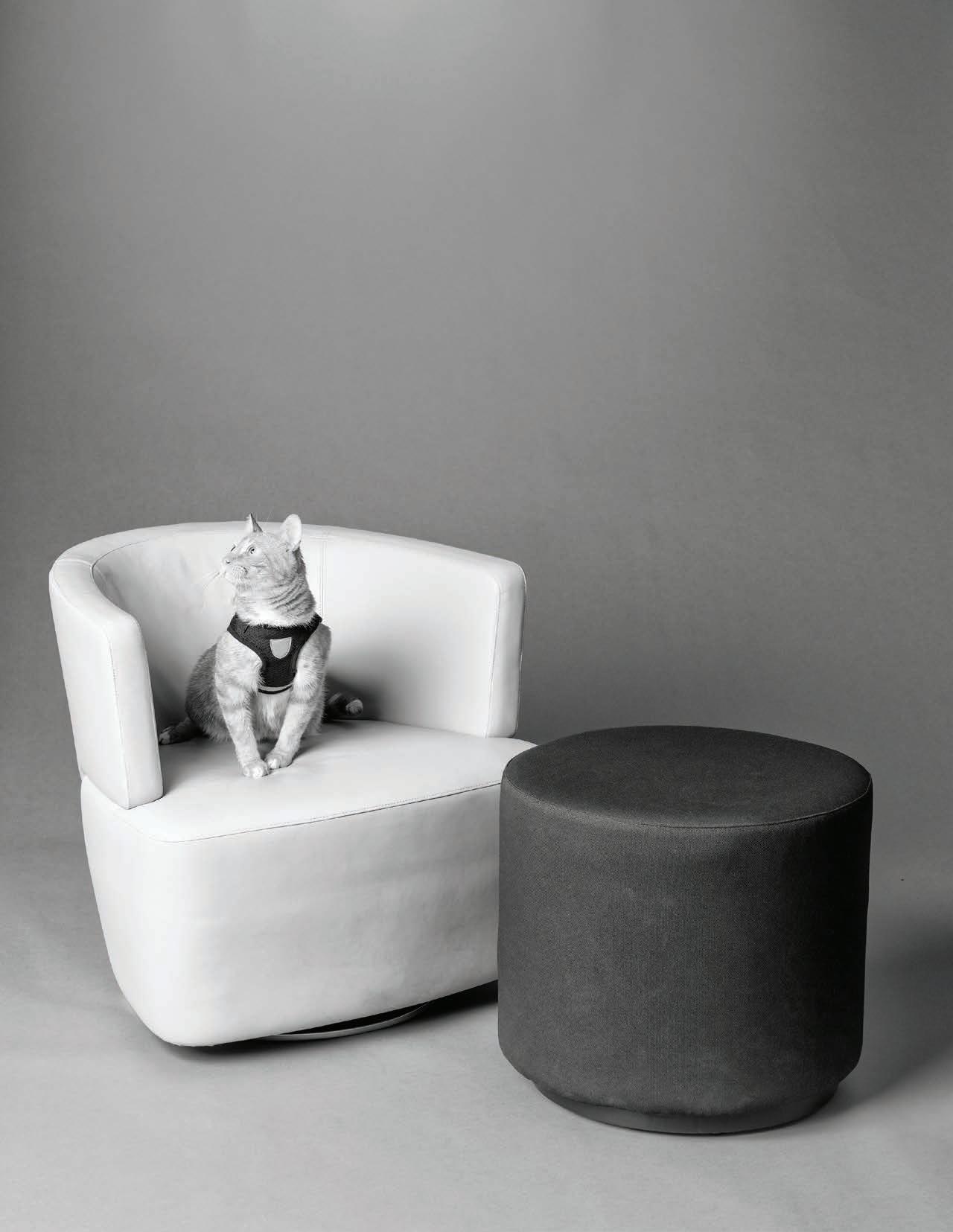
6 Educating a 21st-Century Veterinarian Penn Vet's new curriculum launches for Class of 2026 16 Student Life, Reimagined Augmenting the holistic student experience 20 Modesty Burleson, V'07 Hard Work Makes a Fairy Tale Come True 24 Planned Gifts That Keep on Giving Dr. Frederick Hendricks gives for lasting impact Read Bellwether online at repository.upenn.edu/bellwether SPRING/SUMMER 2023 #99 2 DEAN’S MESSAGE 26 IN THE OFFICE 28 RESEARCH 30 SCHOOL NEWS 37 FACULTY NEWS 42 STUDENT NEWS 43 ALUMNI NEWS 46 IN MEMORIAM 48 CALENDAR Contents Departments
Dear Penn Vet Community,
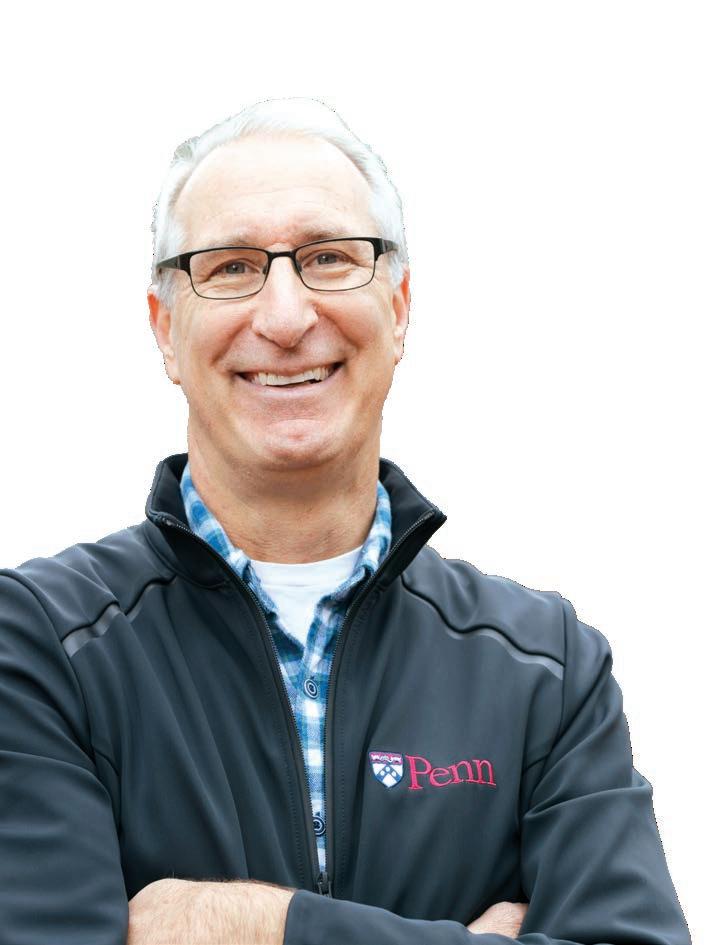
Welcome to the future!
The next generation of veterinary students is faced with rapid advances in medical knowledge and technology. There is a lot to learn, and to discern. All this learning takes place in an ever more interconnected world that demands of them to place their work in a broader context. Our students strive to the be best veterinarians possible, and at the same time make the world a better place. More and more, they are considering new and innovative roles beyond the traditional boundaries of veterinary medicine. It’s our job at Penn Vet to prepare them — tomorrow’s veterinarians — for whatever career paths they choose to pursue, whether in private practice, academia, public service, business and entrepreneurship, corporations or NGOs, or some unique combination of them all. That’s a tall order.
To that end, of all the new endeavors we have undertaken during my time here, maybe the most rewarding has been the launch of our new first year curriculum. Introduced this past August to the Class of 2026, it is a major milestone in the history of Penn Vet, and already paying dividends: our “first-years” are engaged in a more integrated, dynamic, active, and problem-solving environment. Importantly the new curriculum retains foundational content (e.g., cell and molecular biology) while delivering on social-cultural context, clinical competency, community engagement, and communication skills. Students spend less time in the classroom, and more time in group study, labs, capstone projects, and problem-solving sessions. Our goals are to strengthen competency-based learning, while maximizing the quality of student life, academic success, and mental wellbeing.
magazine, you’ll see these dynamics at play. Our feature story on page 6 highlights the outstanding work of our education deans, Dr. Kathy Michel and Dr. Amy Durham; our curriculum redesign team; and our course-block leaders on instituting this much-heralded change. On page 16, meet two new leaders of our Office of Admissions and Student Life team who are championing “all-around” student development through experiences, communities, and scholarship. You will hear from two of our young people pictured on the cover and in our feature story, Alexis Massey, V’26, and Kiera Zimmerman, V’26, who are at the “just beginning” stage of their academic careers. And you’ll come across our other two students on the cover: Miranda Starr, V’23, on page 23; and Alex Valle, V’23, on page 42; both at the threshold of their post-VMD, veterinary careers.
DEAN’S MESSAGE
2 BELLWETHER SPRING/SUMMER 2023
We sit down with alumna Modesty Burleson, V’07, on page 20, who I had the opportunity to meet at Spy Coast Farm in Lexington, Kentucky. She discusses her own career trajectory, and her mentorship of early-career veterinarians.
As we wind down this school year and prepare to graduate the Class of 2023 and welcome the Class of 2027, I want to thank you all for your continued support of the School. Whether you are a student, an alum, or a friend, thank you for being part of Penn Vet and the mission-critical, lifesaving work that we do. Penn Vet remains at the forefront of our profession because of your time, and your generosity.
EDITORIAL
Editor
Martin J. Hackett
Contributing Editor and Writer
Sacha Adorno
Writers at Large
Katherine Unger Baillie, Martin J. Hackett
Class Notes Editor
Shannon Groves
Faculty | Staff Notes Editor and Production Manager
John Donges
DESIGN
Associate Creative Director
Hannah Kleckner Hall
Designer
Anne Marie Kane, Imogen Design
Photographers at Large
John Donges, Hannah Kleckner Hall, Eric Sucar
Contributing Photographer
Lisa Godfrey
ADMINISTRATION
Gilbert S. Kahn Dean of Veterinary Medicine
Andrew M. Hoffman, DVM, DVSc, DACVIM
Associate Dean of Institutional Advancement
Hyemi Sevening
Chief Communications Officer
Martin J. Hackett
Director of Alumni Relations
Shannon Groves
Director of Annual Giving
Mary Berger
Directors of Development
Margaret Leardi (New Bolton Center)
Helen Radenkovic (Philadelphia)
CHANGE OF ADDRESS
Sarah Trout
Office of Institutional Advancement
School of Veterinary Medicine
University of Pennsylvania
3800 Spruce Street
Suite 151 E, Philadelphia, PA 19104
strout@vet.upenn.edu
215-746-7460
Andrew M. Hoffman, DVM, DVSc, DACVIM
Gilbert S. Kahn Dean of Veterinary Medicine
None of these articles is to be reproduced in any form without the permission of the School. ©2023 by the Trustees of the University of Pennsylvania. The University of Pennsylvania values diversity and seeks talented students, faculty, and staff from diverse backgrounds. The University of Pennsylvania does not discriminate on the basis of race, sex, sexual orientation, gender identity, religion, color, national or ethnic origin, age, disability, or status as a Vietnam Era Veteran or disabled veteran in the administration of educational policies, programs or activities; admissions policies; scholarship and loan awards; athletic, or other University administered programs or employment. Questions or complaints regarding this policy should be directed to: Executive Director, Office of Affirmative Action and Equal Opportunity Programs, Sansom Place East, 3600 Chestnut Street, Suite 228, Philadelphia, PA 19104-6106 or by phone at 215-898-6993 (Voice) or 215-898-7803 (TDD).
WWW.VET.UPENN.EDU/BELLWETHER 3
It’s our job at Penn Vet to prepare them — tomorrow’s veterinarians — for whatever career paths they choose to pursue, whether in private practice, academia, public service, business and entrepreneurship, corporations or NGOs, or some unique combination of them all.
First Up...
THE TRAVELING FLAG
One day late last summer, I was working alone in our Institutional Advancement office when I heard a knock at our front door. So, I answered it. At the door were a few alumnae with an unexpected delivery, or more like a “give back.” They were returning V’19’s class flag to our Alumni Affairs department after borrowing it as a photo prop for several classmates’ weddings over the course of a year.
The flag and its travels — see page 43 for the itinerary — exemplify for me the exuberant spirit of Penn Vet. Here, people become lifelong friends and a close community of colleagues. It is this familiarity that we wanted to capture in the Spring | Summer 2023 Bellwether
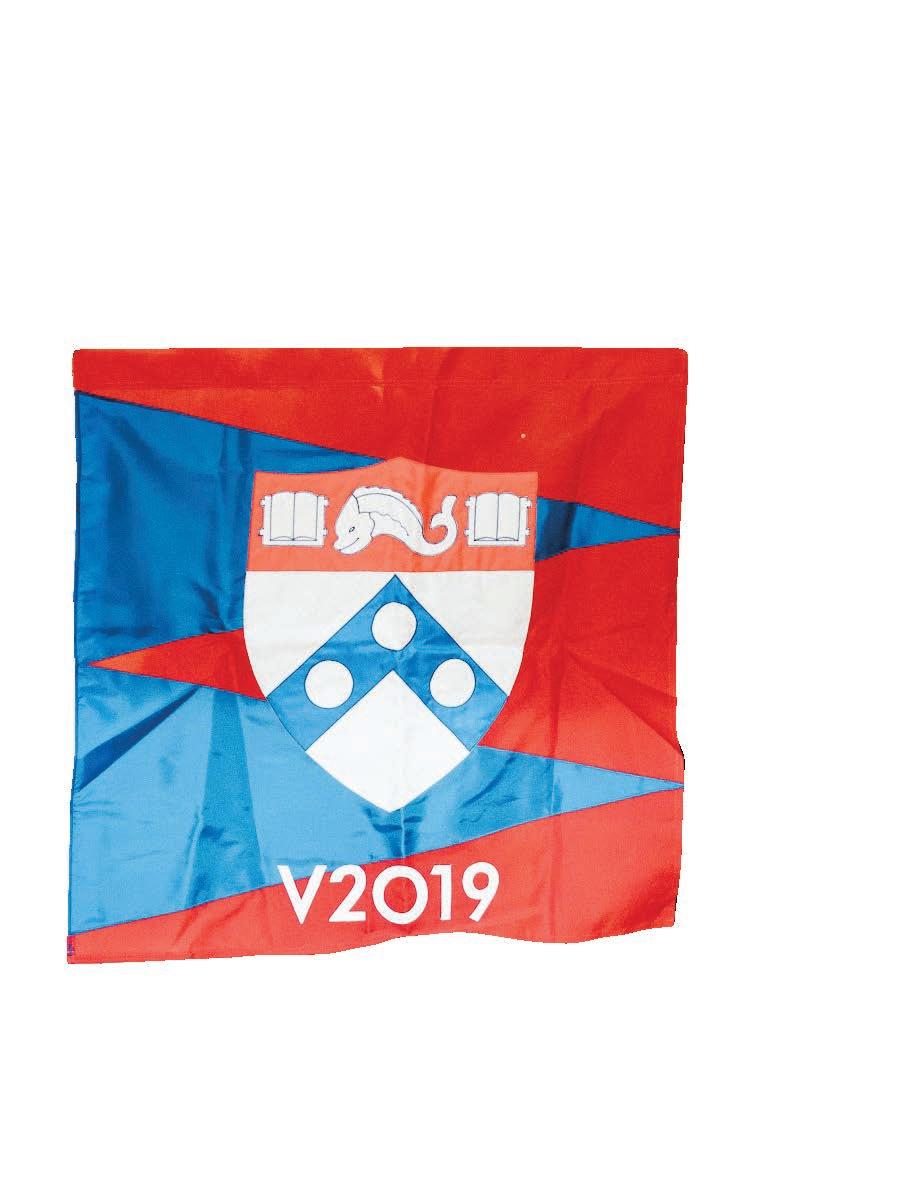
From a new curriculum to student life to one alumna’s journey and more, the issue tells the all-encompassing story of what it means to be part of the Penn Vet community. It captures why alumni proudly travel and parade their class flag years after graduating from the School. I love this notion of “waving” the class flag at life’s major milestones. That front door encounter made me smile; it still makes me smile. I am excited for our readers to get a glimpse into how Penn Vet, the School of Veterinary Medicine at the University of Pennsylvania, is shaping veterinary medicine and lifelong friendships.
Enjoy the issue.
MARTIN J. HACKETT, EDITOR mhackett@vet.upenn.edu
4 BELLWETHER SPRING/SUMMER 2023
From her home base in Philadelphia, Sacha Adorno writes about people, institutions, and businesses working to make the planet a better place for all life on it.
BEHIND EVERY GREAT COMPETITOR IS A GREAT COLLABORATION.
A senior science news officer in Penn’s Office of University Communications, Katherine Unger Baillie has been writing stories highlighting the incredible scientific insights of Penn Vet researchers for more than a decade.


SPORTS MEDICINE AT NEW BOLTON CENTER
From meticulous diagnosis to precisely targeted therapy, you can trust the care of your equine athlete to the experience of New Bolton Center’s team of comprehensive Sports Medicine clinicians. A competitive edge. Here, everyone gets it.
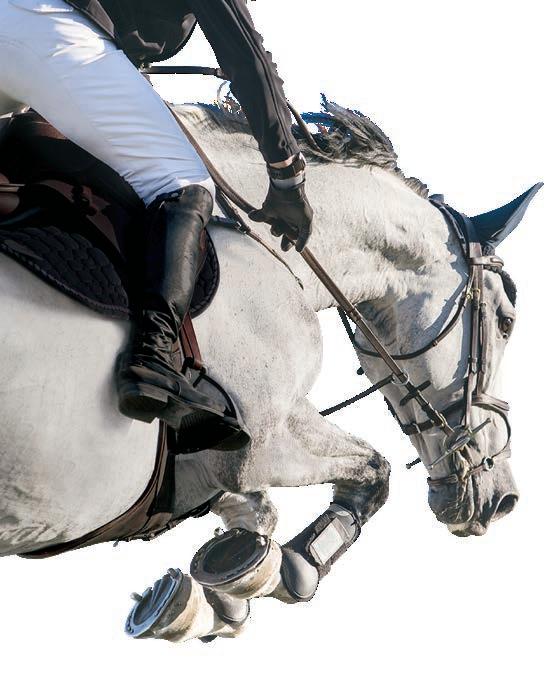
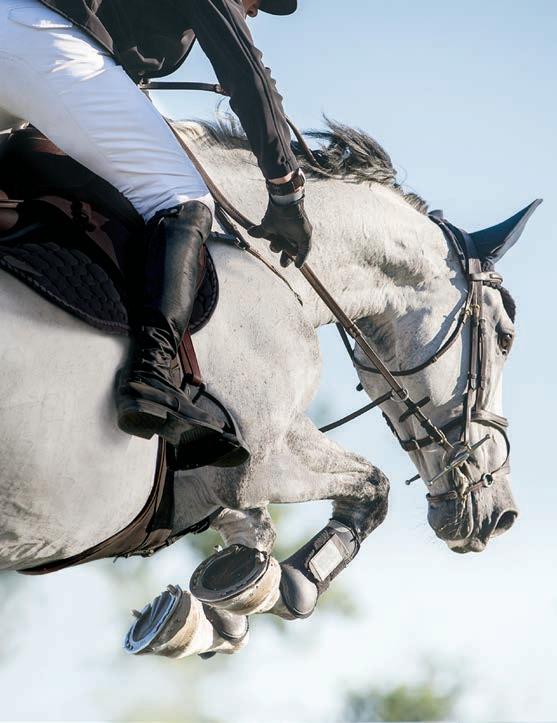
Philadelphia freelance professional photographer Lisa Godfrey – pictured with her Chihuahua, Mr. Pink –has been combining her passion for visual art and lifelong love of animals for more than 25 years, specializing in lifestyle photography on location for editorial, advertising, and corporate clients.
To make an appointment, call 610-444-5800 or visit us online at vet.upenn.edu/newboltoncenter
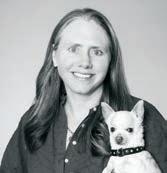
WWW.VET.UPENN.EDU/BELLWETHER 5 CONTRIBUTORS

6 BELLWETHER SPRING/SUMMER 2023
“My first go 'round was lab after lab and hours of sitting and listening. This year, everything is much more integrated and dynamic. I’m loving it!”
ALEXIS MASSEY, V’26
BY SACHA ADORNO
A 21ST-CENTURY VETERINARIAN
In early 2022, Alexis Massey, V’26, voluntarily withdrew from her first year at Penn Vet for family reasons. She returned a year later to a radically transformed learning experience. Penn Vet’s new curriculum had launched for the Class of 2026 and those to follow.
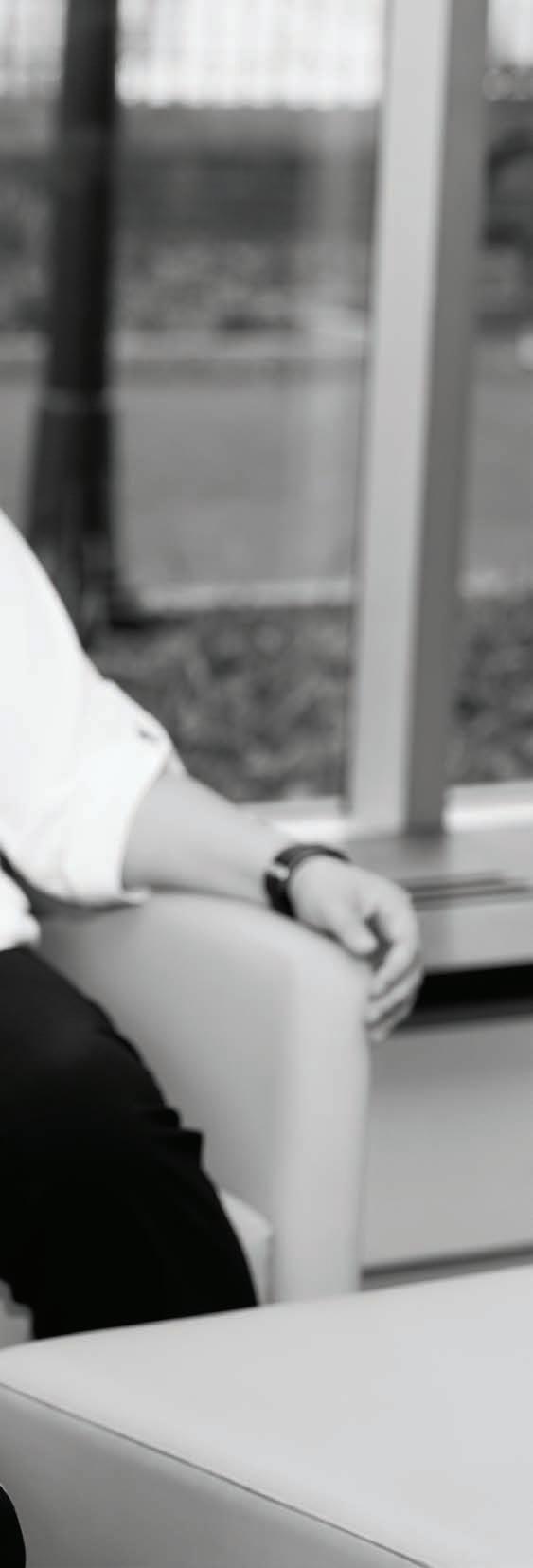
WWW.VET.UPENN.EDU/BELLWETHER 7
Alexis Massey, V’26 (foreground), and Kiera Zimmerman, V’26, sat down with Bellwether to talk about Penn Vet’s new integrated and dynamic, first year veterinary curriculum.
Gone were the long hours of siloed didactic lectures on core information. In their place were shorter, integrated learning blocks with lectures and hands-on activities focused on animal health and disease and critical, independent, and scientific thinking.
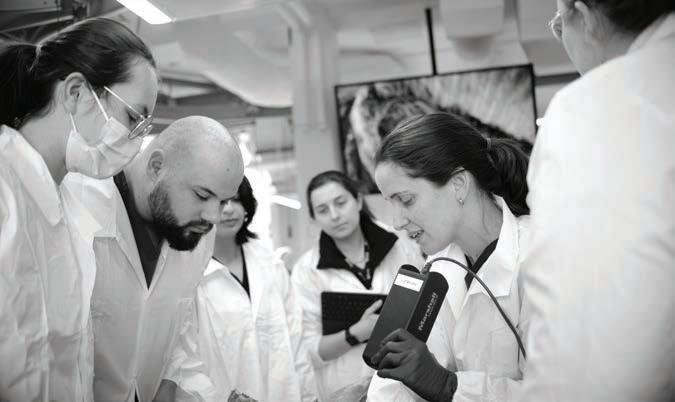
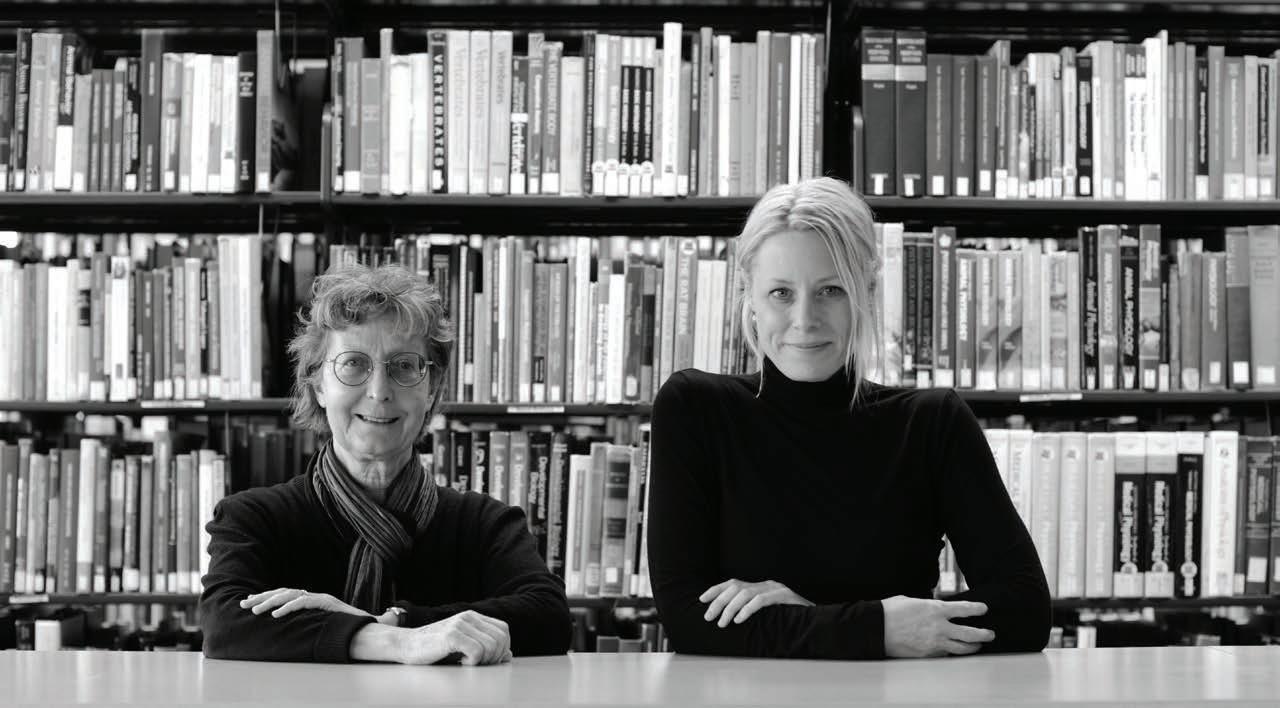
“My first go 'round was lab after lab and hours of sitting and listening,” said Massey. “The content and exams focused mostly on one subject, with little overlap or larger context. This year, everything is much more integrated and dynamic. I’m loving it!”
THE EVOLUTION OF EXCELLENCE
Penn Vet’s last major curriculum change was in the 1970s, when the School introduced a core/elective model. Subsequent years brought new additions and refinements, but nothing close to the magnitude of the 2023 overhaul.
8 BELLWETHER SPRING/SUMMER 2023
Above: Dr. Elizabeth Woodward holding camera imaging technology in the new anatomy lab. The images appear on screens throughout the space for students working in small groups to see. Top: Dr. Kathy Michel (left) and Dr. Amy Durham pictured in Penn Vet's Steven W. Atwood and Jean Austin du Pont Library.
Dr. Kathryn E. Michel Associate Dean for Education and Professor of Nutrition
Although innovative at the time, the old curriculum couldn’t keep pace with a changing world.
Discoveries in basic science and their translation into clinical treatments happen exponentially faster than 50 years ago. Technologies and wearable devices continue to transform education and medicine almost every day. And new understandings of adult learning and student and teacher needs have led to pedagogical innovations that better engage everyone.
“All of this means, we must prepare a different kind of graduate,” said Dr. Kathryn E. Michel, associate dean for education and professor of Nutrition. “The current rate of biomedical discovery means that even over the course of a veterinary education there will be new diagnostic capabilities and treatments when a student graduates that didn’t exist when they began school, so we must educate and cultivate lifelong learners.”
In other words, teaching students how to think rather than simply what to know is the purpose of today’s veterinary education.
WORKING BACKWARD
In 2017, Michel, building on an effort begun by former Associate Dean of Education Dr. Tom Van Winkle, convened a redesign team to identify and implement a curricular model for 21st-century veterinarians.
“A group of dedicated and talented staff and faculty from across disciplines came together and said: ‘let’s do this right,’” said Dr. Amy Durham, assistant dean for education and professor of Anatomic Pathology. “We also enlisted the help of outside advisors and did a tremendous amount of research. What shook loose was CBVE.”
Wellness
Penn Vet’s new curriculum explicitly addresses well-being to ensure graduates can recognize their own and their colleagues’ stress and its sources. Students learn to engage in self-care, recognize when professional support is appropriate for themselves or others, and remedy adverse situations.
Diversity
Diversity is an essential part of Penn Vet’s mission and core to educating students who live and work in a diverse world. The new curriculum prepares future veterinarians to help build a more equitable and inclusive veterinary profession and to serve diverse communities with respect and empathy and without bias and discrimination.
A
FIXED LENS ON WELLNESS & DIVERSITY
“THE CURRENT RATE OF BIOMEDICAL DISCOVERY MEANS THAT EVEN OVER THE COURSE OF A VETERINARY EDUCATION THERE WILL BE NEW DIAGNOSTIC CAPABILITIES AND TREATMENTS WHEN A STUDENT GRADUATES THAT DIDN’T EXIST WHEN THEY BEGAN SCHOOL, SO WE MUST EDUCATE AND CULTIVATE LIFELONG LEARNERS.”
WWW.VET.UP ENN.EDU/BELLWETHER 9
Created by the American Association of Veterinary Medical Colleges (AAVMC), CBVE is competency-based veterinary education, an outcomesbased, learner-centered framework. Its mission, as defined by the AAVMC, is “to prepare graduates for professional careers by confirming their ability to meet the needs of animals and the expectations of society.”
“CBVE is modeled on the principle of backward design in education,” said Michel. “It starts with a desired endpoint or outcome — the characteristics, skills, and knowledge we want students to graduate with — and works backward to create a road map for getting there. We are beholden to our students, clients, patients, and other key stakeholders that we graduate competent practitioners and scientists, and in a traditional curriculum there isn’t really a way to evaluate competency in all areas. We can teach a lot of information and give high stakes examinations that show content mastery, but that doesn’t mean the abilities — the competencies — to practice in a safe way are there.”
So, Penn Vet’s curriculum redesign team started at the end and looked to the AAVMC CBVE framework’s nine domains of competency. To be practice ready after four years, Penn Vet students would need to exhibit competency in clinical reasoning and decision-making, individual animal care and management, animal population care and management, public health, communication, collaboration, professionalism and professional identity, financial and practice management, and scholarship.
THE RIBBON COURSES
The Hippiatrika
BECOMING A VETERINARY CLINICIAN
This course is named after one of the earliest collections of writings on veterinary medicine from the fifth and sixth centuries. The Hippiatrika covers aspects of professional development not included in the study of animal systems and diseases and incorporates labs that teach essential clinical skills and provide early exposure to clinical practice.
“The course provides the building blocks to train excellent veterinary clinicians. It focuses on veterinary-specific skills, such as physical examinations, diagnostic tests, animal handling, principles of population medicine or surgical skills, but also emphasizes skills relevant to all professionals and humans such as communication, welfare, reasoning, ethics, or diversity, equity, and inclusion.”
Of Clouds and Clocks
BECOMING A VETERINARY SCIENTIST
Named in honor of 20th-century philosopher Karl Popper, who introduced the concept that every scientific theory is falsifiable. Of Clouds and Clocks covers principles of scientific enquiry, hypothesisdriven research, applied statistics, and epidemiology, and emphasizes using high-quality evidence to optimize clinical decision-making.
“Throughout the yearlong, active-learning course students develop skills in literature searching, interpretation, statistics, clinical decision-making, productive skepticism, and tolerance for ambiguity. One hallmark of a VMD is their ability to practice high-level medicine based on the best available evidence, and this course empowers our students to do so.”
DR. CRISTOBAL NAVAS DE SOLIS Course organizer with Dr. Jennifer Huck
DR. STEPHEN COLE AND DR. SUSAN BENDER Course organizers
10 BELLWETHER SPRING/SUMMER 2023
From there, the group restructured, integrated, and streamlined material from the old curriculum into a format designed to maximize long-term retention of core material. At the same time, they incorporated new courses, teaching techniques, and technology to prepare students for all facets of veterinary medicine.
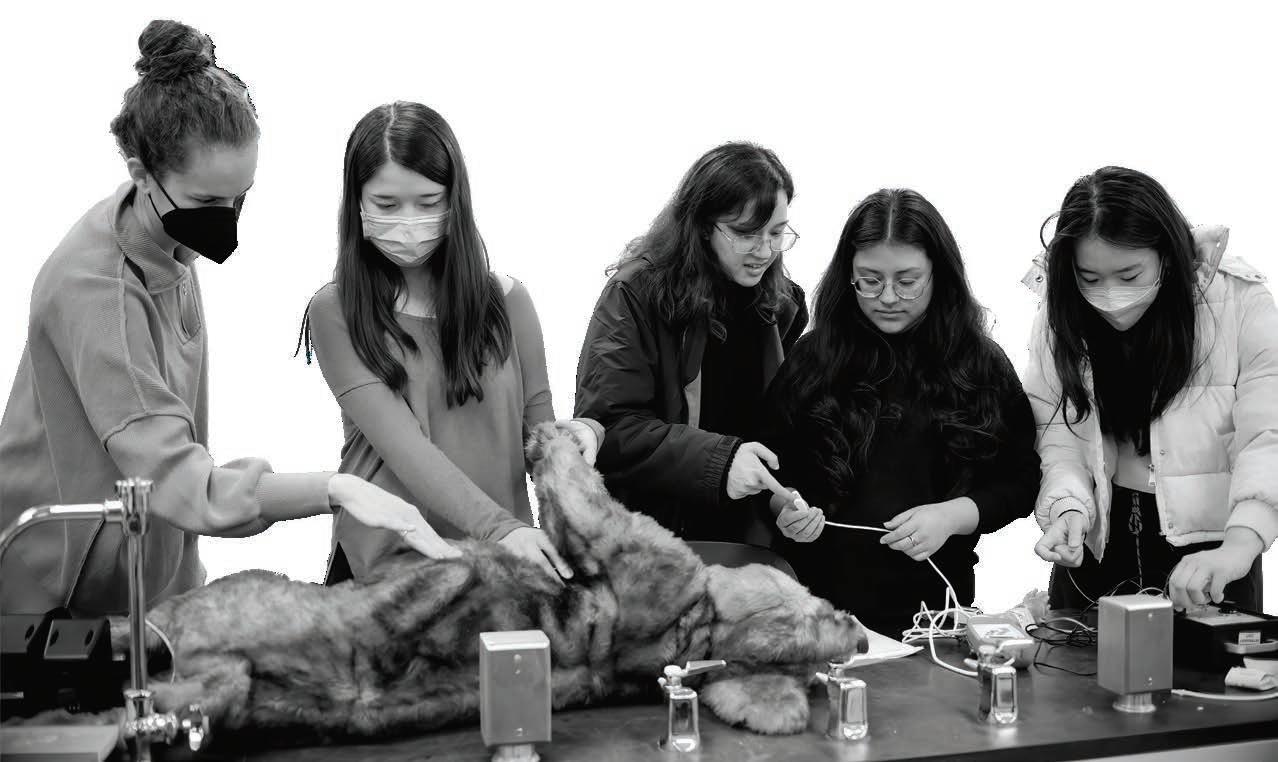
LEARNING, BLOCK BY BLOCK
When Massey started last fall, her schedule looked very different than a year earlier.
Instead of individual classes on subjects like gross anatomy, neurosciences, and physiology, years one and two are now organized into blocks focused on biological processes: Movement & Support; Digestion & Metabolism; Circulation & Respiration; Elimination & Detoxification; Defense & Barriers; Cognition, Senses & Response; and Reproduction & Development.
“We’re still giving didactic lectures with excellent information, but the content has been trimmed to core knowledge based on the backward design
process,” said Durham. “This enables us to offer more labs, hands-on experiences, and asynchronous and group activities with clinical case integration. Students spend roughly the same amount of time learning every week, but the active learning opportunities give the sense of a lightened schedule, which we hope translates into better wellbeing.”
In year one, students learn about Animals in Health , delving into the form and function of healthy animals. Year two will build on this, presenting the same blocks through the lens of Animals in Disease , looking at prevention, diagnosis, and treatment.
“This holistic approach toward each animal system is powerful,” said Dr. Elizabeth Woodward, clinical associate professor, Biomedical Sciences. “They learn the anatomical terminology of a particular system, as well as the histology and physiology that go along with it, and the interconnection between all of these. It’s really helping students understand how an entire system works. The old curriculum was more limiting because it taught anatomy, histology, and physiology in isolation of each other.”
WWW.VET.UPENN.EDU/BELLWETHER 11
Students in a clinical skills lab use a simulation model to practice the physical examination of the cardiovascular system in a dog.
When they launch in 2025 and 2026, the clinical blocks in years three and four, respectively, will be organized in three-week segments, during which students work in the clinics with faculty. Interspersed throughout are elective classroom and lab blocks that let students explore areas of interest.

At the beginning of each semester, students receive a foundational toolkit with background about material covered in upcoming blocks. And at the end of each semester, a capstone period provides them with an opportunity to apply and integrate information learned in preceding blocks.
Additionally, two “ribbon courses” thread throughout the first and second years. The Hippiatrika: Becoming a Veterinary Clinician focuses on professional development and clinical skills and gives newer students exposure to real patient cases in the clinic. And Of Clouds and Clocks: Becoming Veterinary Scientists emphasizes the principles of scientific inquiry and critical thinking skills. (See sidebar on page 10.)
“Coming to vet school, I hoped there were going to be classes like these that discuss the nonclinical aspects of being a veterinarian,” said Kiera Zimmerman, V’26. “Learning animal science is so important. But it’s just as important to know how to communicate with clients and to understand biases, among other ‘soft subjects.’ This is all part of being a veterinarian.”
She added about The Hippiatrika’s clinical component, “I can’t say enough about how great it is! The lectures are hard, and Hippa is a good reminder of what I’m working for and why. Being with animals and applying classroom learning in real-life situations refreshes me for getting back to my studies and having it all make sense.”
Top: Dr. Ali Nabavizadeh, clinical assistant professor of Biomedical Sciences, in the upgraded Anatomy Lab. The space, he said, is dynamic and state-of-the-art. It enables group work and tactile learning and is also used for Hippa mini labs.
Above, Dr. Jennifer Huck (right) teaches a first-year student how to perform a surgical hand tie.
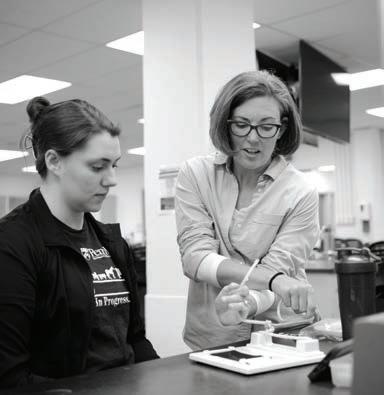
12 BELLWETHER SPRING/SUMMER 2023

WWW.VET.UPENN.EDU/BELLWETHER 13
“Learning animal science is so important. But it’s just as important to know how to communicate with clients and to understand biases, among other ‘soft subjects.’ This is all part of being a veterinarian.”
KIERA ZIMMERMAN, V’26
Dr. Amy Durham
Assistant Dean for Education and Professor of Anatomic Pathology
ONE YEAR DOWN
As enthusiastic as new students are about the curriculum, “the reality is, change is hard,” said Durham. It’s taken some time to socialize faculty and staff to new ways of doing things.
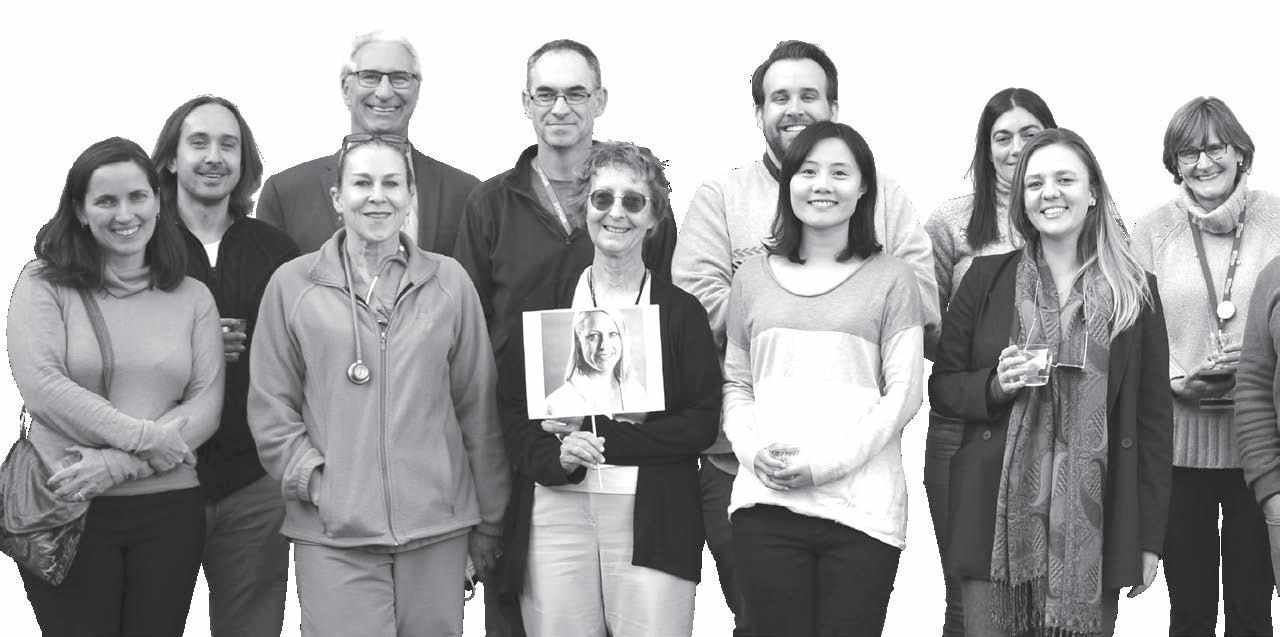
“The Penn Vet community and many of our stakeholders value the School as a research institution; we have a very strong DNA in terms of scholarship,” said Michel. “Some initial resistance to change came from a concern that we’re turning our backs on what Penn Vet is known for and shifting the emphasis from a solid foundation in the basic, foundational sciences to a clinical curriculum. The redesign team was careful in our planning to account for this, and we’re working hard to ensure it doesn’t happen.”
It also helps that students and faculty, who are queried about their courses, present insights into areas and opportunities for improvement. And Penn Vet curriculum administrators meet with student focus groups from each course to gather input. The data collected from evaluations inform refinements in content, delivery, and assessments.
And any reported hiccups are expected, said Zimmerman, who appreciates that students have a role in smoothing them out.
“Our input is so valued, and it’s exciting to help everything take shape,” she said. “I chose Penn Vet for its excellence and innovation and trust the School to do what’s best for students and the profession. So far, so good!”
“A GROUP OF DEDICATED AND TALENTED STAFF AND FACULTY FROM ACROSS DISCIPLINES CAME TOGETHER AND SAID: ‘LET’S DO THIS RIGHT,’”
14 BELLWETHER SPRING/SUMMER 2023
We thank the redesign team and acknowledge their time and effort enhancing Penn Vet’s curriculum. Below are the faculty and staff who spent countless hours re-engineering our student learning experience. A number of them gathered for a photo at last fall’s curriculum launch celebration.
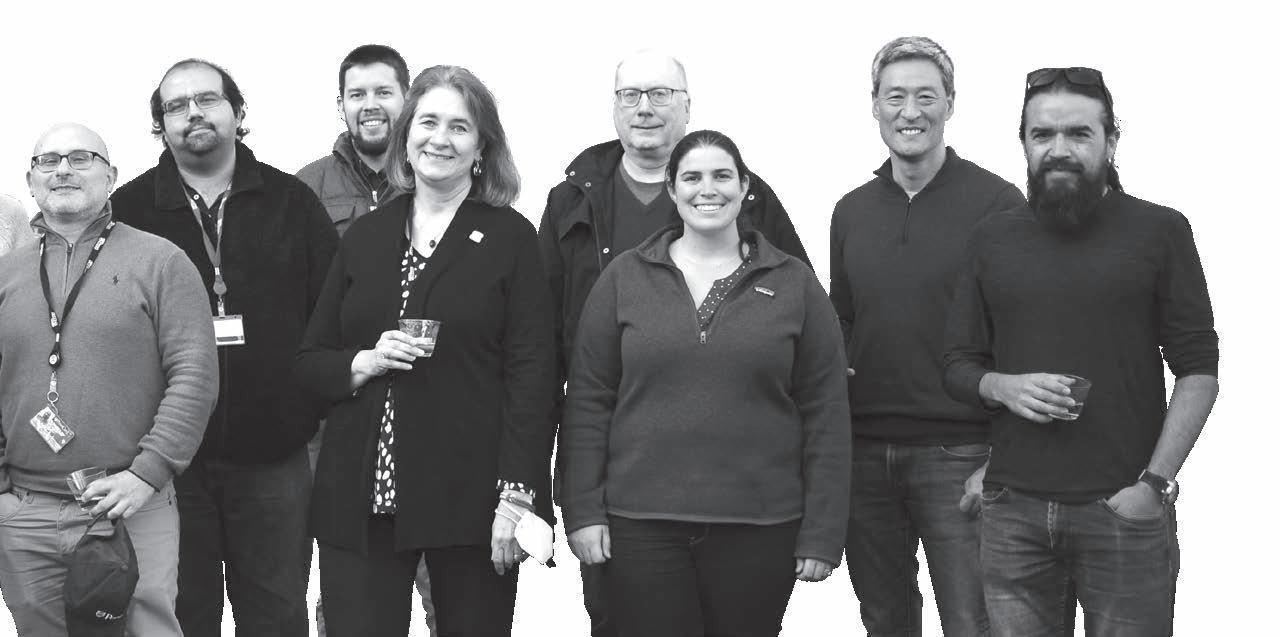
REDESIGN TEAM
Kathryn Michel
Associate Dean for Education
Amy Durham
Assistant Dean for Education
Jennifer Punt
Associate Dean for One Health
Montserrat Anguera
Associate Professor, Biomedical Sciences
Rose Nolen-Walston
Associate Professor, Large Animal Internal Medicine
Katie Rook
Assistant Professor, Clinical Dermatology and Allergy
Elizabeth Woodward
Clinical Associate Professor, Biomedical Sciences
Jessica Marcus
Core Curriculum Director
Dan McCall
Curriculum Coordinator
BLOCK/COURSE LEADERS
Michelle Abraham
Gary Althouse
Jorge Alvarez
Michael Atchison
Susan Bender
Leontine
Benedicenti
Charles Bradley
Christine Cain
Candace Chu
Stephen Cole
Jolie Demchur
Len Donato
Julie Engiles
Erick Gagne
Kristin Gardiner
Nancy Gartland
Anna Gelzer
Rebecka Hess
Andrew Hoffman
Jennifer Huck
Olena Jacenko
Anna Kashina
Mary Lassaline
Christopher Lengner
Frank Luca
Timothy Manzi
Elizabeth Mauldin
Katherine Mauro
Michael May
Megan McClosky
Andrew Modzelewski
Ariel Mosenco
Ali Nabavizadeh
Cristobal Navas
de Solis
Cynthia Otto
Mark Oyama
Eric Parente
Meghann Pierdon
Martina Piviani
Michael Povelones
Enrico Radaelli
Virgina Reef
Erica Reineke
Dean Richardson
Mary Robinson
Mark Rondeau
Pascale Salah
Patricia Sertich
Deborah Silverstein
Carlo Siracusa
Caroline Sobotyk
Louise Southwood
Raymond Sweeney
Jason Syrcle
Charles Vite
Koranda Walsh
Brittany Watson
Kathryn Wulster
thank you
OUR CURRICULUM COMMITTEE
WWW.VET.UPENN.EDU/BELLWETHER 15
BY SACHA ADORNO
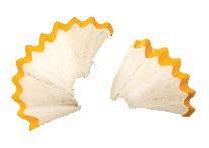
STUDENT LIFE,











































































A new curriculum is just one part of a broader reimagining of the Penn Vet student experience, from start of school to finish and beyond. Third-year student

reimagined
Nicastro, who will serve as a US Army veterinarian upon graduation, chose Penn Vet because, “it’s special and offers so much.” The City of Philadelphia. The University of Pennsylvania. A reputation for excellence and innovation. An unrivaled caseload and diverse client base. All these elements figured into his selection, and all have shaped his experience thus far.
“Penn Vet is very unique, with a history, culture, and community you just don’t see elsewhere,” he said. “I haven’t been disappointed. The School absolutely delivers on all of its promises: in the classroom, in the clinic, as well as outside of the classroom.”










































































Nevertheless, he offers there are opportunities to augment experiences, especially as the Penn Vet community is still recovering from a pandemic tailspin that forced a reconfiguring of many beloved traditions.

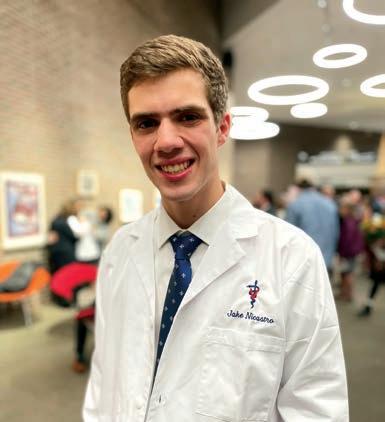

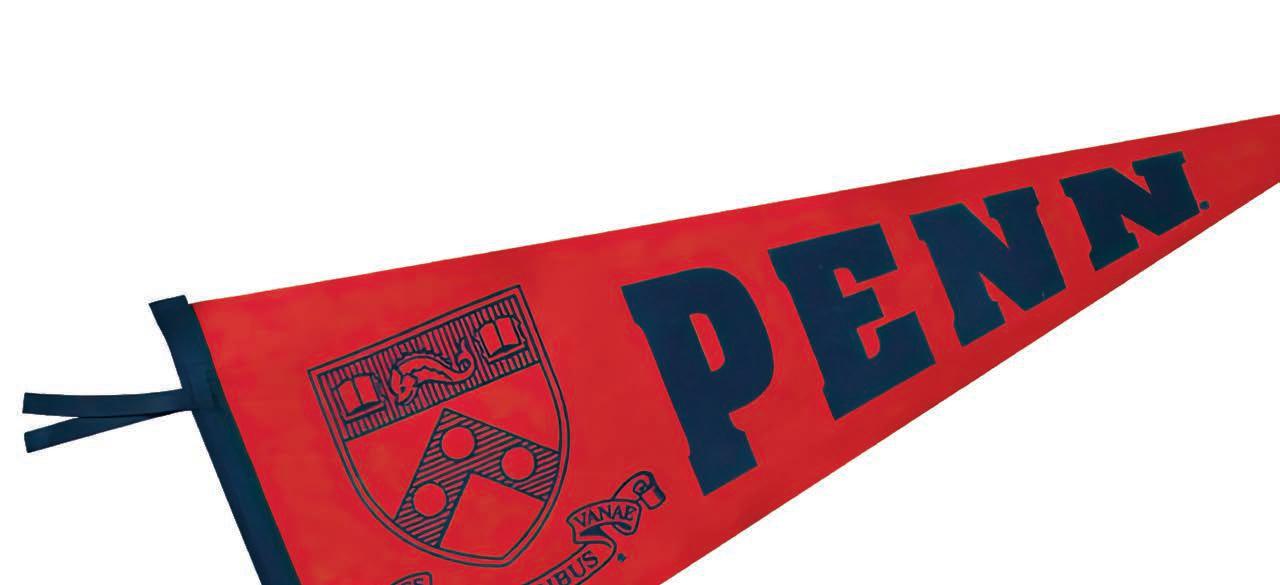
Nicastro is excited by some of the changes coming out of the Office of Admissions and Student Life, the umbrella for admissions, financial aid, registration, and other areas tangentially related to academics. The office has its eye on the holistic student experience.
“There are so many areas where students need support as they navigate the drastic lifestyle changes that come with vet school,” said Meredith Lockyer, director of students. “Penn Vet is a pioneer in all
“Penn Vet is very unique, with a history, culture, and community you just don’t see elsewhere. I haven’t been disappointed. The School absolutely delivers on all of its promises: in the classroom, in the clinic, as well as outside of the classroom.”
JAKE NICASTRO, V’24
Penn Vet students attend the 2023 SAVMA Symposium at the University of Illinois at UrbanaChampaign. (Photo courtesy of Jack Aversa, V'26)
LISTENING AND LEARNING

Leading the charge is Claire Vanna Bruno, who joined Penn Vet in July 2022 as assistant dean of Admissions and Student Life. Her first step has been to listen—to students, faculty, and staff.
“I’ve been on a six-month listening tour to understand the environment and community I came into. I want to understand what changes are needed and what folks find important,” she said. “The way I put it with my team is that we are looking at how the School has been doing things and asking if these are the best ways to do them. Often the answer is a resounding yes, and other
Among the emerging themes across her conversations are the need for better connection among students, faculty, and staff and more community-building and engagement activities.

“Post-pandemic and in our technology age, so much has changed in terms of student expectations in higher education, and veterinary school is certainly not an exception,” said Lockyer. “These are all areas we’re focused on moving
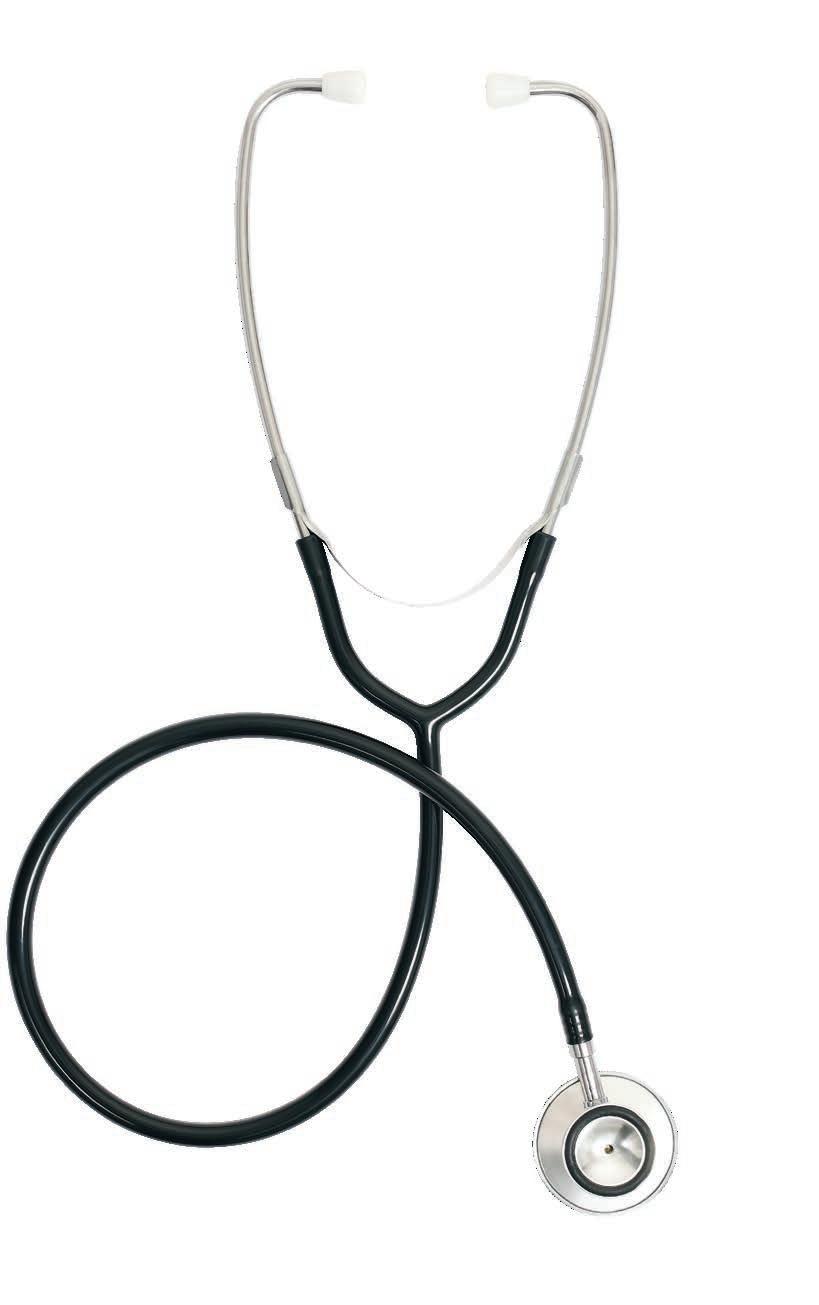










































































Student voices are vital to the process. And Bruno’s team now meets monthly with student representatives to hear what’s working and what needs refining in terms of policies, procedures, and
Additionally, the Office of Admissions and Student Life is reimagining pivotal milestones, like commencement. Come summer 2023, orientation will start in the summer, with online sessions for students, parents, and partners. Once on campus, students will enjoy more interactional activities to get to know each other, faculty, staff, the city, and
18 BELLWET HER S PRIN G/SUMMER 2023
IN WITH THE NEW—AND THE OLD


Taking an “out with what doesn’t work, in with what does” attitude, Bruno and Lockyer are also starting to reintegrate popular long-standing traditions into the post-pandemic new normal as they create new ones.
“Students have spent the last few years communicating more by text and other technologies than in person, and we want to reinforce the value of out-of-class bonding,” said Lockyer. “We love hearing about the many activities that grew the culture here — SAVMA Auction, Skit Night, and chili cook-offs are a few — and look forward to building on what made student life so special pre-pandemic.”
Nicastro applauds the effort and responsiveness to student suggestions, particularly ideas from his classmates. The Class of 2024’s first academic year at Penn Vet was during the height of the pandemic when everything was virtual. They missed out on Parents & Partners Day, a weekend event when loved ones peek into the life of a veterinary student.
“We had the idea of appending V’24’s Parents & Partners in-person event onto our November 2022 White Coat Ceremony and took it to Claire and Meredith two weeks before the ceremony,” Nicastro said. “Everyone really came through and put together a great gathering for our class. It was a real indication of just how important the student experience is to the School.”
“If there’s a need, or a desire, to enhance the Penn Vet student experience, we’ll consider it,” Lockyer said. “Nothing is off the table for discussion if it helps students thrive and succeed.”
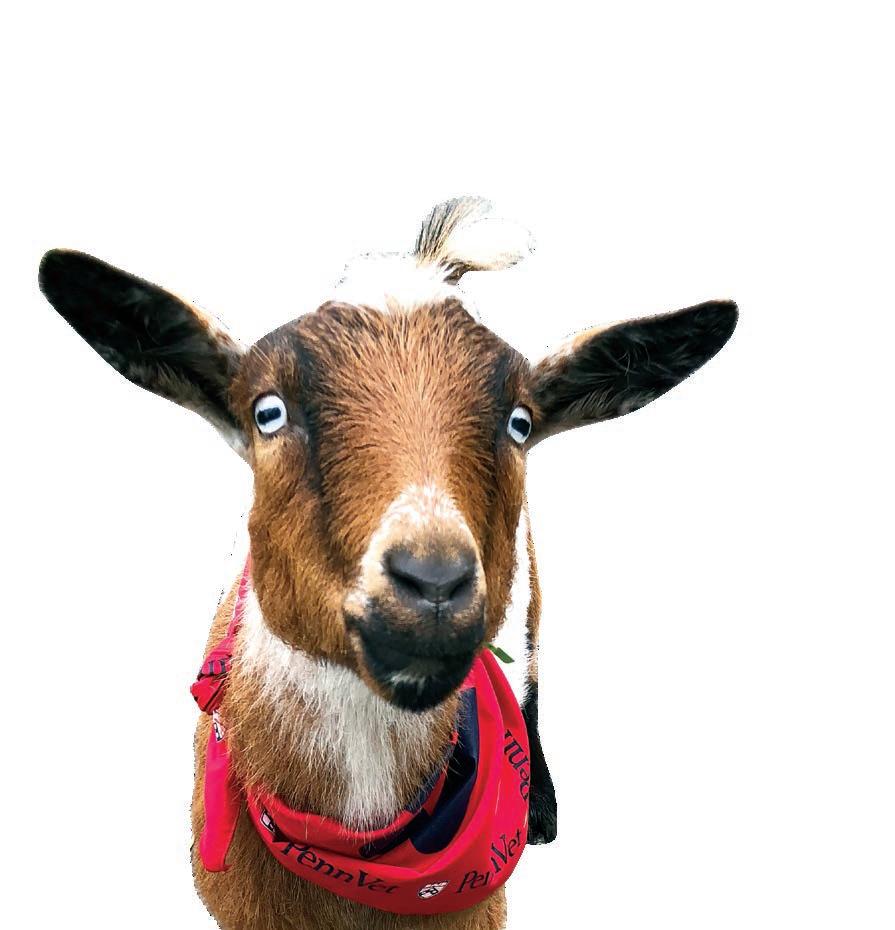
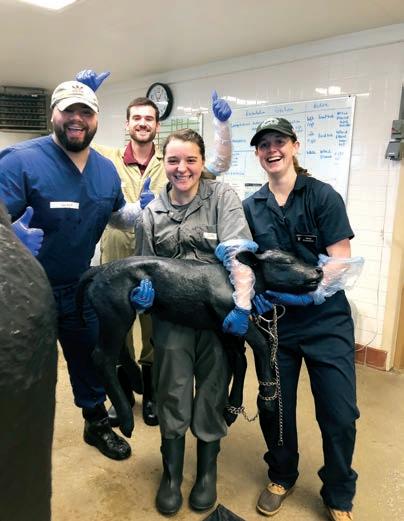
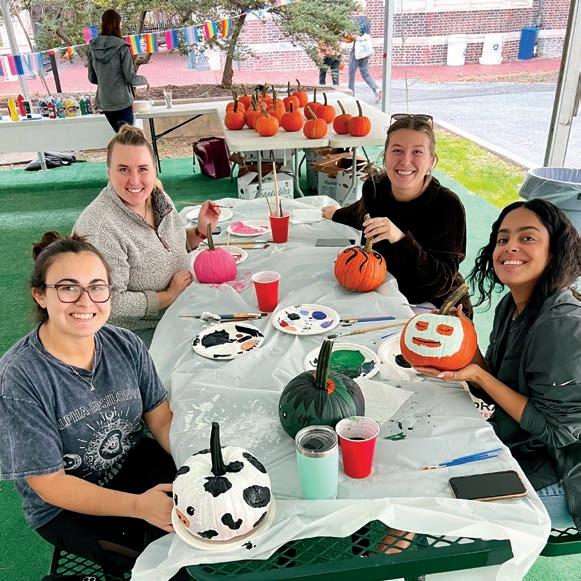










































































WWW.VET.UPENN .EDU/BELLW ETHER 19
Top, students enjoy painting pumpkins during Multicutural Week. (Photo by Ashley Hinton) Above, students participate in an obstetrics wet lab sponsored by the Reproduction Club. (Photo courtesy of David Buckwalter, V'26)
Hard Work Makes a Fairy Tale Come True
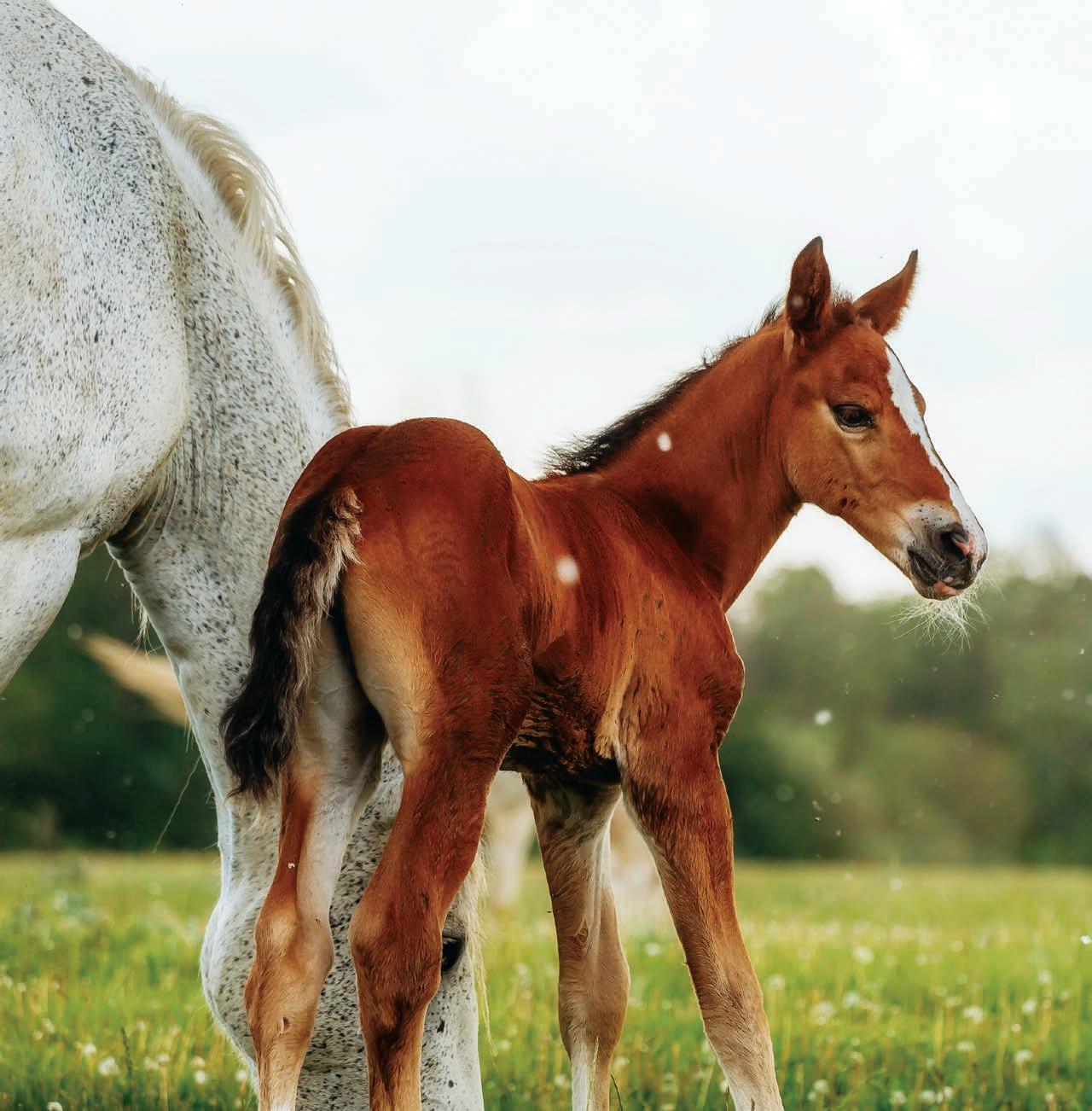 by Sacha Adorno
by Sacha Adorno
20 BELLWETHER SPRING/SUMMER 2023
specialist in equine reproduction, Dr. Modesty Burleson, V’07, is COO of Spy Coast Farm. Her career path, she said, has been like a fairy tale.
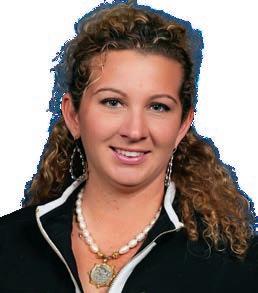
A horse girl from a very young age, Burleson was six when she started riding horses and nine when she got her first pony, named Dawn Treader. He was waiting in her front yard on Christmas morning, red bow and all.
“I was obsessed. He boarded at Woodberry Farm, with trainer Chris Gemmill, and I was there every weekend, after school, and all summer,” said

There, Burleson had a fateful encounter with Dr. William Solomon, V'68, owner of Pin Oak Lane Farm, a full-service farm and equine veterinary clinic in York County, Pennsylvania.
“He was checking on Dawn Treader,” she said. “Watching Dr. Solomon work was an aha moment for me: I would be a veterinarian. I never once wavered in that decision.”
Years later, Burleson worked for Solomon at Pin Oak Lane during her summers as a Virginia Tech undergrad. She helped Solomon breed and care for Thoroughbred and Standardbred mares and stallions, narrowing her veterinary career goals into the area of equine reproduction.
“I am who I am today in part because of Dr. Solomon,” she said. “I loved helping him with the breeding work and became fascinated with everything related to breeding horses. He helped me choose Penn Vet — all the veterinarians I knew went to the School — where I then found a new community of mentors.”
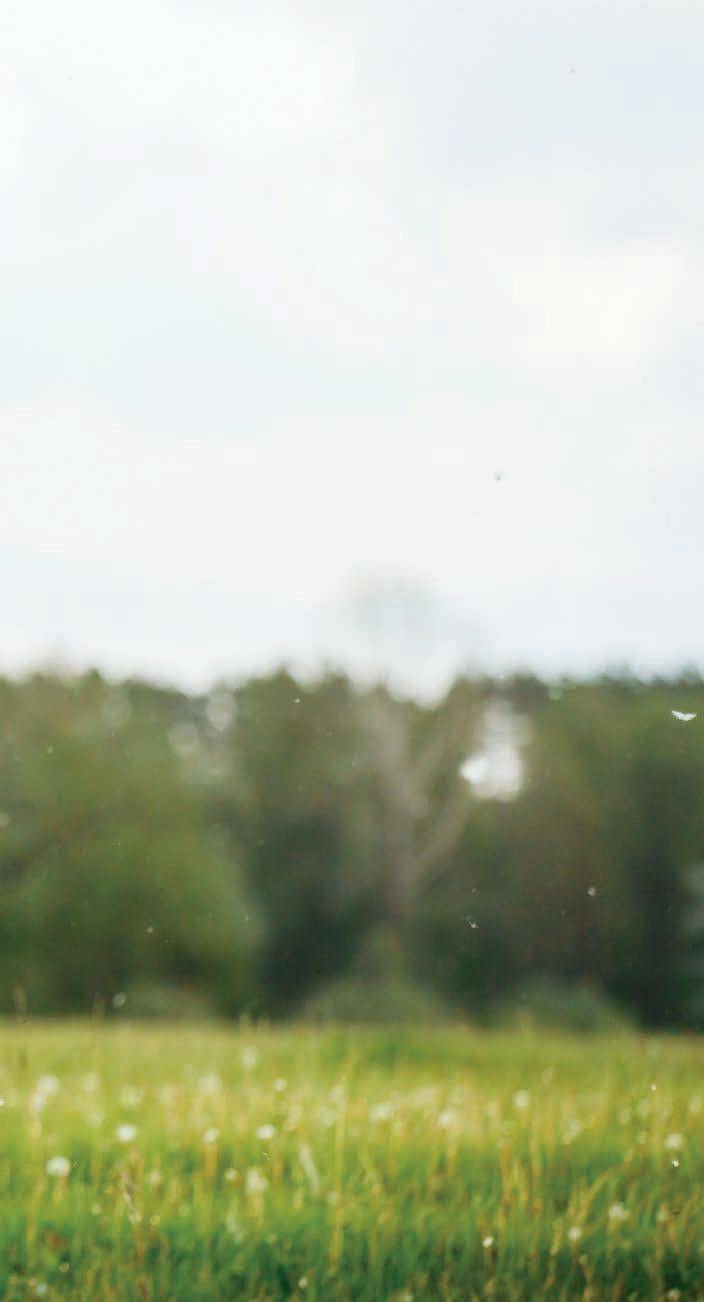
WWW.VET.UPENN.EDU/BELLWETHER 21
Burleson named Dr. Patricia Sertich, associate professor-clinician educator, Large Animal Reproduction at New Bolton Center, and her fellow students as inspirations. “Penn Vet was a foundational experience,” she said. “I took advantage of everything available at New Bolton Center and had amazing mentors and friends, many of whom I’m still in touch with today.”
A Dream Comes True
Burleson’s plan after graduation was to work for Solomon, but a detour through Kentucky, the horse capital of the world, changed everything.
“Kentucky is rich with opportunities to practice equine medicine,” she said. “I went for a yearlong ambulatory internship with Dr.Riddle at Rood and Riddle Hospital and expected I’d return to Pennsylvania when it was over.”
But, after a year, Burleson extended her stay in Lexington. “Then, I met my husband Lyn Burleson and landed my dream job,” she said, “I fell in love with Kentucky, and I’m still here today.”

While working as an associate for Rood and Riddle, Burleson was called to examine a colicky mare at Spy Coast Farm, a small new enterprise in town with roughly 20 sport horses and a handful of employees.
After this, Spy Coast's manager contacted her for a few other cases. One visit turned into something more, when owner Lisa Lourie asked Burleson to join the staff as resident vet.
“This was the fairy tale offer,” Burleson said.
The Fairest Farm in the Land
That was 2010. Thirteen years later, Spy Coast has expanded to 800 acres, 75 employees, and more than 300 horses. It’s the largest of three farms, the other two are in Florida and North Carolina.
Burleson has been instrumental in the expansion, working as the right hand to Lourie, for the past two years in the official role as COO. “I’m proud of what Lisa and I have built — we call it Disneyland for horses,” she said. “Lisa is so forward thinking. When she has an idea, she runs with it and trusts me to as well.”
The duo’s vision and doggedness are evident in Spy Coast’s evolution. The farm started as a breeding business and expanded to include equine rehabilitation and fitness, young horse development and training, and contagious equine metritis quarantine.
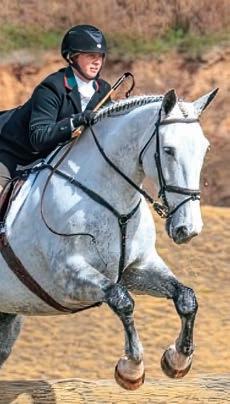
Education has also become a core part of Lourie and Burleson’s mission for the farm. Most recently, Spy Coast opened an Equine Education Center with an event space, indoor arena, and lecture hall.
Top: Burleson doing what she loves. Bottom: Burleson with Penn Vet Dean Andrew Hoffman during his recent visit to Spy Coast.
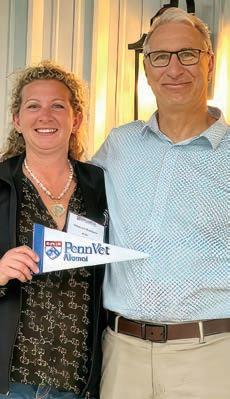
22 BELLWETHER SPRING/SUMMER 2023
“I am who I am today in part because of Dr. Solomon. I loved helping him with the breeding work and became fascinated with everything related to breeding horses.”
Dr. Modesty Burleson, V’07 Spy Coast Farm
“It’s really state-of-the-art and features everything anyone interested in or involved with horses would want in a conference or event facility. Lisa designed it with all needs in mind,” Burleson said. Beyond the teaching and learning facility, the farm offers programs for high school, college, and vet school students, as well as ‘second chance’ employment through local programs. Perhaps because she gained so much from her own mentors, or maybe because she’s a natural teacher, Burleson loves working with students, whether they identify as future veterinarians or not. “If I can help change somebody's career path or lead them in the right direction if they need help, then that’s really a special part of my day,” she said. She’s looking forward to this summer and welcoming Miranda Starr, V'23, as Spy Coast’s first veterinary intern from Penn Vet.
“I am over the moon and can’t wait for Miranda to arrive and see everything,” said Burleson. “She's very interested in pathology. When she came to visit, I took her straight over to University of Kentucky Veterinary Diagnostic Laboratory (UKVDL) to visit the necropsy floor. It blew her away that I took time to connect her to the people at UKVDL. But Penn Vet gave me the opportunity to meet so many people and build networks that it’s natural for me to want to do the same for veterinarians just starting out.”
Happily Ever After
Of course, Burleson can’t predict the future. For now, she’s living her dream in Kentucky. She has a job she loves and a family farm as a second job. With Lyn, she owns and runs a commercial family Thoroughbred breeding and sales operation in Midway, Kentucky called Burleson Farms. They foal 60 and breed more than 100 Thoroughbred mares a year. She’s also mom to two young sons, Levi and Tucker.
“Of everything I’ve done and worked for, I’m most proud of the work/life balance I’ve created,” she reflected. “I’ve helped build an amazing place at Spy Coast. I’m the world’s most devoted baseball mom. And sometimes I even find time to sit on my porch with a glass of wine and watch my chickens in our yard.”
While Burleson may liken it to a fairy tale, her career is really a story of working hard, taking chances and embracing change. She's always open to new opportunities and nurtures a close community of supporters, who recognize an excellent, ambitious veterinarian and inventive businessperson when they meet her.
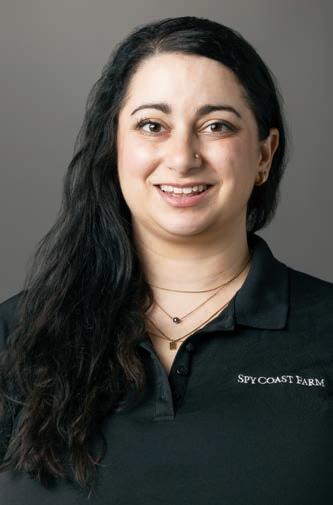
“Of everything I’ve done and worked for, I’m most proud of the work/life balance I’ve created. I’ve helped build an amazing place at Spy Coast. I’m the world’s most devoted baseball mom. And sometimes I even find time to sit on my porch with a glass of wine and watch my chickens in our yard.”
 Dr. Modesty Burleson, V’07 Spy Coast Farm
Dr. Modesty Burleson, V’07 Spy Coast Farm
WWW.VET.UPENN.EDU/BELLWETHER 23
Miranda Starr, V’23, heads to Spy Coast this summer as the farm's first intern from Penn Vet.
PLANNED GIFTS THAT KEEP ON
Dr. Frederick Hendricks
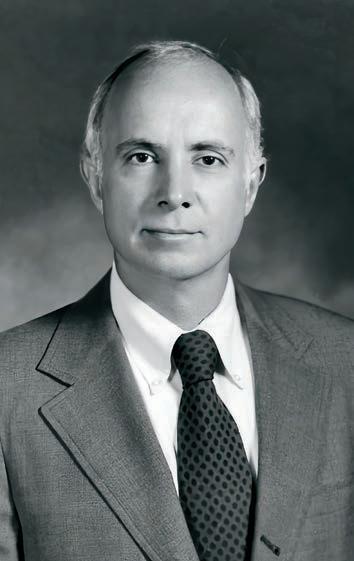
Dr. Frederick Hendricks has been a Penn Vet client since the 1980s, when one surgeon sealed what would become a longtime relationship with Ryan Hospital.
Hendricks, who lived then and still does in the D.C. metro area, had taken his Dalmatian Alfie to Penn Vet for surgery. All went well, until Alfie had a setback after he was home. His Ryan Hospital surgeon cut short her vacation to be on site when Alfie and Hendricks returned. It turned out a second trip to Philadelphia wasn’t necessary then, but the surgeon’s commitment made Hendricks a Penn Vet client for life.
“It was an astounding measure of dedication, and Penn Vet has been our go-to for any specialty services ever since,” he said. “I’m a loyal client.”
Over the years, Penn Vet has become more than a veterinary medicine provider for the couple. It’s one of Hendricks’s philanthropic priorities. A longtime donor, he supports the Good Samaritan Fund and Ryan Hospital and has also included Penn Vet in his estate plans, endowing two funds that will have long-lasting impact long after he passes away.
24 BELLWETHER SPRING/SUMMER 2023
Philanthropy
DR. FREDERICK HENDRICKS
p Dr. Frederick Hendricks
Passion Equals Purpose
“If there’s a unifying characteristic among people who make planned gifts, it’s deep passion for an issue or organization,” said Penn Vet’s Associate Dean of Institutional Advancement Hyemi Sevening. “Dr. Hendricks certainly exemplifies this. He has a huge heart and is a wonderful partner in our mission to advance veterinary science and medicine.”
Animal lover Isabel Robson, who died in 2003, was another example. Robson owned, bred, and showed dogs and was an avid, award-winning equestrian. She also had a close relationship with Penn Vet as a client and donor, bequeathing $11 million to the School. Twenty years after her death, the endowments created from her gift have doubled. And it has supported research efforts that have contributed to more than 100 research projects.
Robson’s gift was sizeable by most standards, but Sevening pointed out that even modest planned gifts can make a difference. “Estate gifts that some people might consider ‘small,’ can and do, make a mighty and long-lasting impact for future Penn Vet students, faculty, patients, and clients,” she said.
She shared three examples: The Walter L. Montgomery Scholarship Fund, established in 1985 with a $50,000 bequest, has risen in value to more than $256,000 and supported 26 students so far. In 1988, Elizabeth S. Zies left $86,665 to Penn Vet for the Frederick and Elizabeth S. Zies Memorial Fund. The fund is now valued at more than $304,000 and has provided scholarships to 18 students. And the Anne Linn White Memorial Fund was established in 1988 with $144,483. The gift has grown to more than $537,800 and extended scholarships to 37 students to date.
A Gift That Keeps on Giving
It’s this kind of legacy Hendricks wants to establish with his giving. “I’ve been fortunate in life,” he said. “I’m not interested in villas and sailboats in the Caribbean or ski lodges in Aspen. That type of luxury just doesn’t inspire me,” he said. “My luxury is giving to education and scholarships, environmental conservation, and animal welfare organizations. This is what makes me happy; it’s what matters to me. It’s my privilege to be able to do so.”
WWW.VET.UPENN.EDU/BELLWETHER 25 LEARN MORE
explore planned giving options, call us at 215-898-1480 or email vet-advancement@vet.upenn.edu. 1Montgomery Scholarship Fund $50,000 BEQUEST $256,000 TODAY 26 STUDENTS SUPPORTED 2 Zies Memorial Fund $86,665 BEQUEST $304,000 TODAY 18 SCHOLARSHIPS 3 White Memorial Fund $144,483 BEQUEST $537,800 TODAY 37 SCHOLARSHIPS
To
IN THE OFFICE WITH Dr. Liz Arbittier, V’01
Certified Veterinary Acupuncturist, Associate Professor of Clinical Equine Field Service, University of Pennsylvania School of Veterinary Medicine
By Sacha Adorno
After years on the road with Penn Vet’s William Boucher Field Service team, Dr. Liz Arbittier has a new position. Now associate director for student affairs at New Bolton Center, she fills an essential role on the Kennett Square campus supporting the academic success and well-being of students.
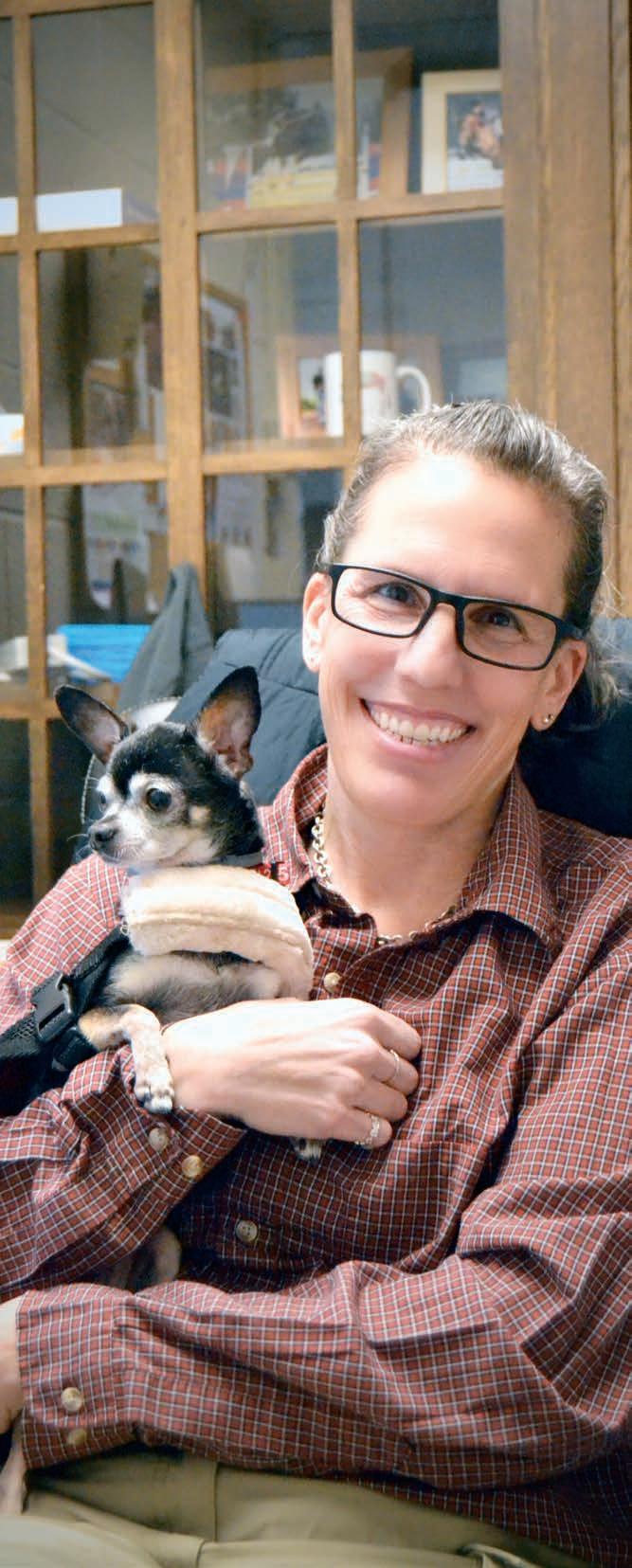
Arbittier’s purview is providing continuity of student care between the School’s Chester County and Philadelphia campuses and helping students, faculty, and staff with issues, concerns, or ideas related to the student experience.
“I'm really excited; it feels like the perfect fit,” she said. “It’s so rare to find one career that’s perfect, and I had that as a clinician with field service. Now, I’ve found a second one that I love just as much.”
Arbittier rarely works alone. Most days, her rescue Chihuahua Edith is in or near her office, which is tucked away in the New Bolton Center library. Edith spends her dog days resting next to Arbittier, making the rounds among studying students, or chasing sunny spots in the library for a warm nap.
When I first met Edith, I was told she was an older dog with special medical needs. She may look aged, but her energy is the opposite of old. Her vet thinks she’s probably between three to five. She had a broken jaw and is missing teeth on one side of her mouth, hence the tongue. Otherwise, she’s in great shape. She’s certified as a service dog and brings joy to everyone who meets her.
IN THE OFFICE 26 BELLWETHER SPRING/SUMMER 2023
Happy board


These are just a few things that make me happy, like cards from clients and photos of my family. I’ve kept select messages from when my former practice used an answering service. Some of the messages that came in were funny, like one from a client who was nine months pregnant and having contractions but still calling to let me know her horse was itching.
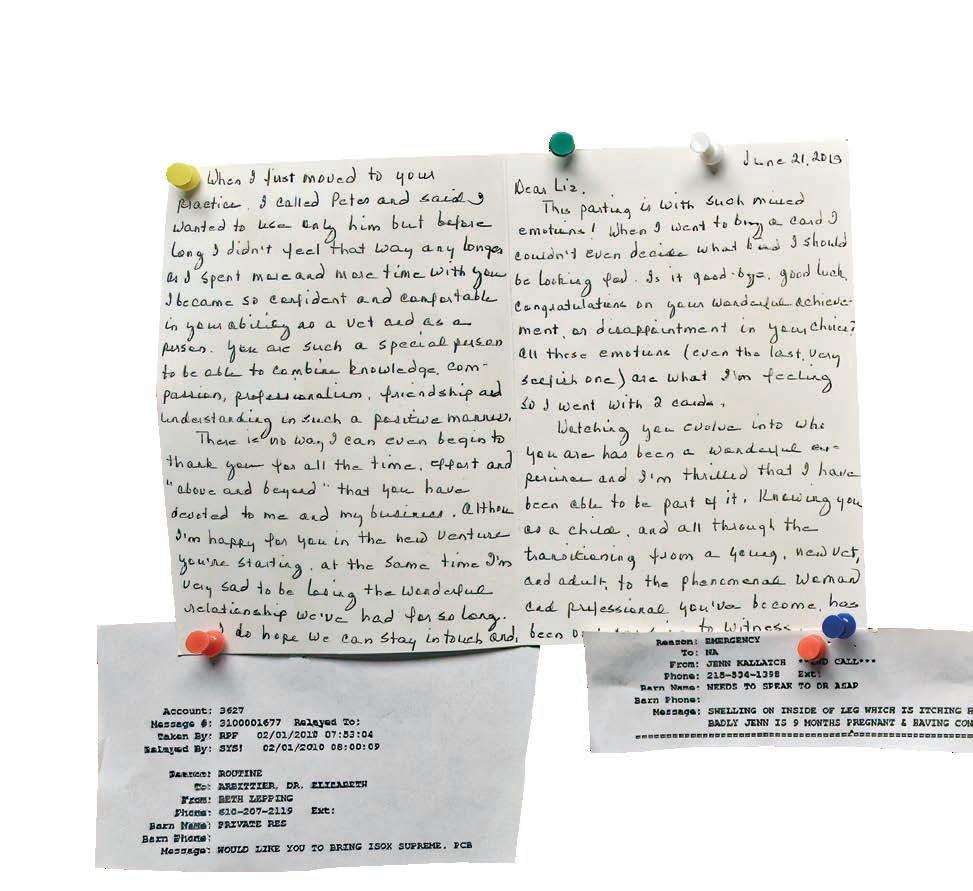
Powerful reminders
I saw the poster online and loved it, especially RBG in the middle. Her words remind me that nervousness isn’t a sign of weakness, that it’s important to speak even when my voice shakes and to not let nerves or feelings of intimidation silence me.


HAARBOR for Animals


HAARBOR stands for Helping Ailing Animals Receive Best Options for Rescue. It’s a nonprofit I started for special needs animals. HAARBOR is a sanctuary, which I run at home – I have eight dogs right now! We also give grants for veterinary care to people who adopt special needs animals. The money is paid directly to veterinarians to help cover some medical expenses for these very special, very sweet animals.
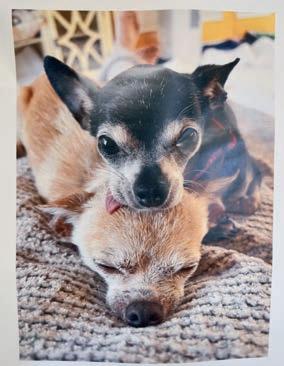
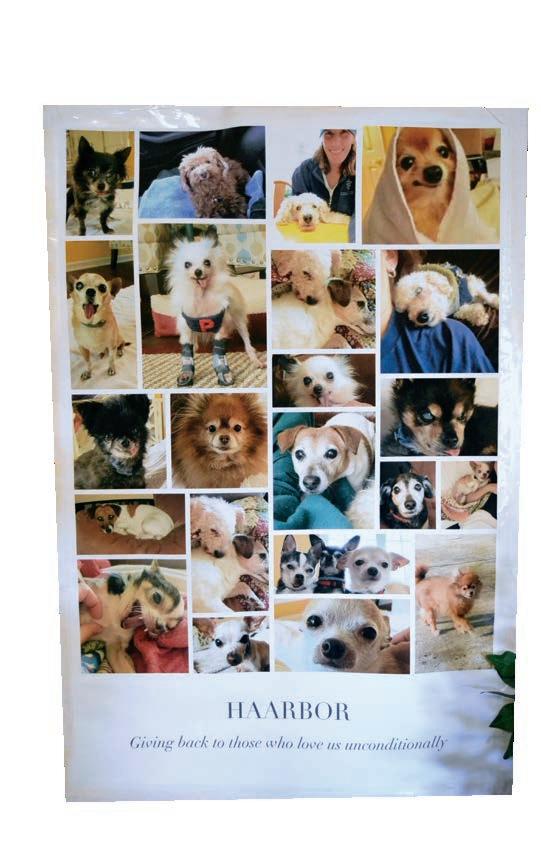
Pewter mug pencil cup
I received this in 1992 when I was editorin-chief of my high school newspaper. The paper won many national awards. My die-hard career goal before college was

WWW.VET.UPENN.EDU/BELLWETHER 27
TRANSLATING EMERGING CANCER SCIENCE INTO EFFECTIVE THERAPIES
by Katherine Unger Baillie
Beyond being devoted companions, dogs share essential aspects of their biology with humans. While cancer scientists frequently use cell lines and rodent models to study how diseases arise and respond to experimental therapies, dogs naturally develop many of the same cancer types as people do and respond to many of the same drugs and therapeutic approaches.
Two projects at Penn Vet are harnessing these similarities to generate new treatments and an enhanced scientific understanding of both canine and human cancers.
“The lines between human and veterinary medicine are starting to blur,” said Dr. Nicola Mason, the Paul A. James and Charles A. Gilmore Endowed Chair Professor in Penn Vet’s Department of Clinical Sciences and Advanced Medicine.
Back in 2017, as part of funding that arose from the Cancer Moonshot launched by then-Vice President Biden, a Penn Vet team led by Mason won a grant from the National Institutes of Health (NIH) enabling the school to serve as the Data Coordinating Center for PRECINCT, short for Pre-medical Cancer Immunotherapy Network for Canine Trials. The Perelman School of Medicine’s Dr. Qi Long joined Mason as a co-lead in 2018 to enhance the project’s data science expertise.
In fall 2022, the Penn team was awarded another grant, providing more than $500,000 a year to continue that work for another five years, with a goal of furthering scientific research to identify new immunotherapies that may translate from dogs to humans.
The coordinating center collects clinical trial data from 10 veterinary and medical academic sites — five awarded in 2017 and an additional five awarded in 2022 — across the country. In doing so, the center ensures each trial acquires high-quality data in a standardized way from canine patients receiving cutting-edge combination immunotherapies.
“Within this network we have a collaborative and interactive group of veterinary and medical clinician scientists who are advancing clinical translation of novel immunotherapeutics in canine patients and discovering correlative biomarkers of response that will inform future human studies,” said Mason.
The center and network represent a growing recognition of the value of comparative oncology, especially when dogs, as a “parallel patient population,” as they are called, bear such similarities to humans.
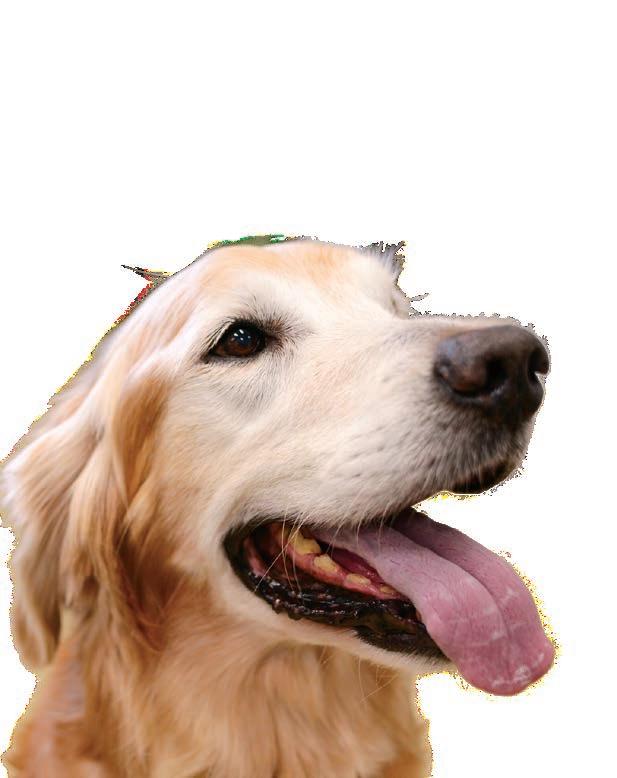
RESEARCH
28 BELLWETHER SPRING/SUMMER 2023
“The Data Coordinating Center is laying the groundwork to ensure that clinicians — doctors and veterinarians alike — have the best evidence at hand when it comes to selecting treatment plans for their cancer patients,” said Dr. Ellen Puré, director of the Penn Vet Cancer Center and the Grace Lansing Lambert Professor of Biomedical Science in the School of Veterinary Medicine. In a second initiative, another Penn Vet-Penn Medicine pairing is pushing a cutting-edge therapeutic strategy closer to potential clinical application.
Dr. Brian Flesner, an oncologist at Penn Vet, and Dr. Keith Cengel, a radiation oncologist at the Perelman School of Medicine, are jointly studying a novel approach to radiation therapy that may one day benefit people and pets.
Their investigation, supported by the Mark Foundation and IBA, focuses on the use of palliative radiation therapy, which can slow tumor growth and reduce pain, but typically requires treatments over several weeks or months. In contrast, the technique Cengel and Flesner are piloting, known as FLASH radiation, is — as the name indicates — far speedier. Patients can receive a palliative course of radiation in just a few visits.
FLASH radiation is also believed to cause less toxicity than traditional approaches, due to the transient and highly precise nature of the radiation exposure. Following an initial study of the technique in dogs with
osteosarcoma begun in 2019, this new trial is using a precisely directed proton beam to target smaller tumors of the oral cavity. The energy of the positively charged particles in the proton beam destroys cancer cells, while penetrating deeply into tissue. This therapy may also spare normal tissues that surround the tumor from being damaged, a “potentially game-changing” outcome, Flesner said.
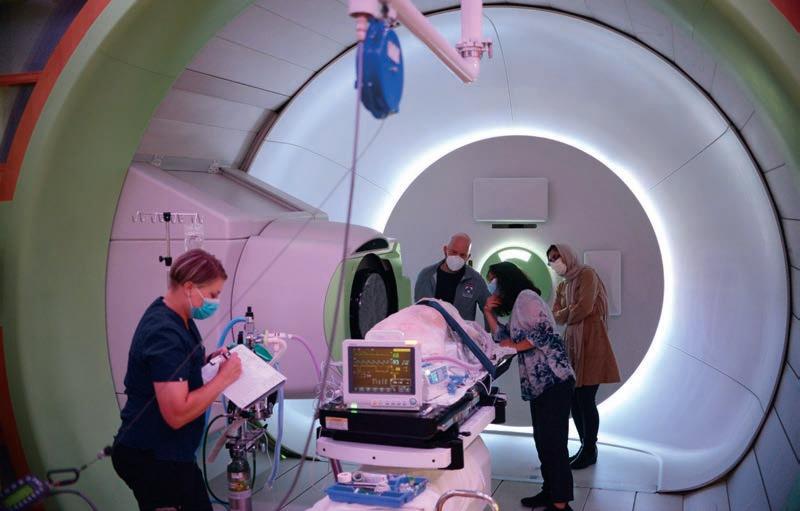
If the results prove promising in canine cancer patients, it may open the door to exploring the use of the technique in people, the researchers say. “We think FLASH is going to be safer and hopefully as efficacious as a standard radiation therapy,” said Flesner.
In the future, the team hopes to extend their study to include cats, to target different tumor types, and to use electrons instead of
protons, which don’t penetrate as deeply. Eventually the goal is to refine protocols for performing the technique in people with various types of cancer.
Last fall, Dr. Meg Ruller, V’18, enrolled her dog Maple, a then13-year-old yellow Labrador retriever, to be the first dog treated in the trial. Maple received two courses of FLASH radiation for a maxillary osteosarcoma, and Ruller saw some subsequent improvement in the tumor site. Maple passed away in early January. But Ruller said the trial not only gave her beloved companion a chance at a better quality of life in her final months, but also felt “like the right move,” given that Maple spent her life as a service dog.
“Being part of a clinical trial, for her, it’s kind of a full-circle moment,” Ruller said. “I like the idea that she is still in service.”
WWW.VET.UPENN.EDU/BELLWETHER 29 RESEARCH
Experts from the Perelman School of Medicine and Penn Vet teamed up for a trial of FLASH radiation on dogs with oral cancer. The trial’s first participant was Maple, a 13-year-old Labrador retriever.
GETTING TO KNOW US
Penn President Liz Magill enjoyed a variety of activities during the first six months of her presidency, including her inauguration on October 21 (above right).
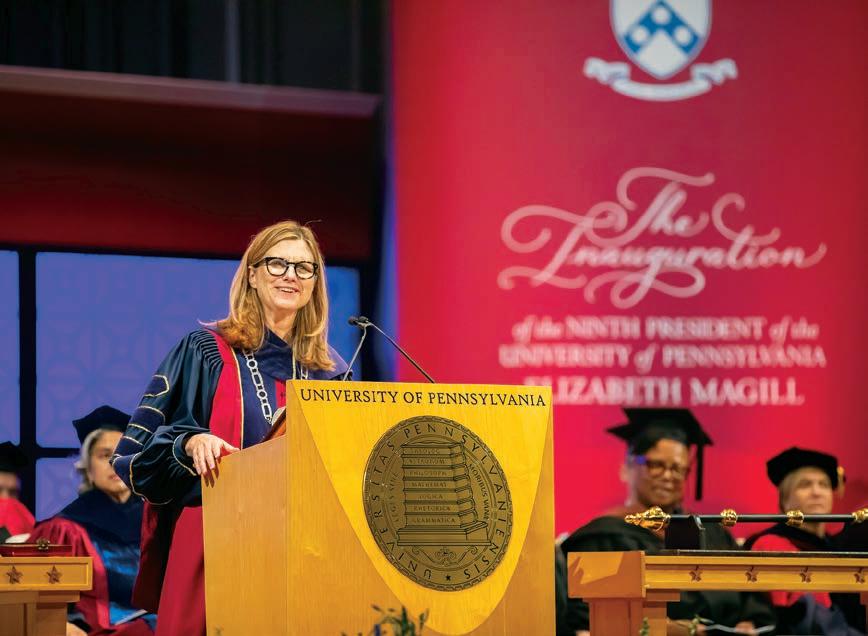
Inauguration weekend’s festivities also included a morning dog walk through campus, where President Magill and her Goldendoodle Olive met with Penn Vet Dean Andrew Hoffman and his dog Buddy (right).
Over those busy six months, President Magill visited and met with students, faculty, and staff from all 12 Penn schools. During her visit with Penn Vet, she spent two half-days touring New Bolton Center and our Philadelphia campus.

SCHOOL NEWS 30 BELLWETHER SPRING/SUMMER 2023
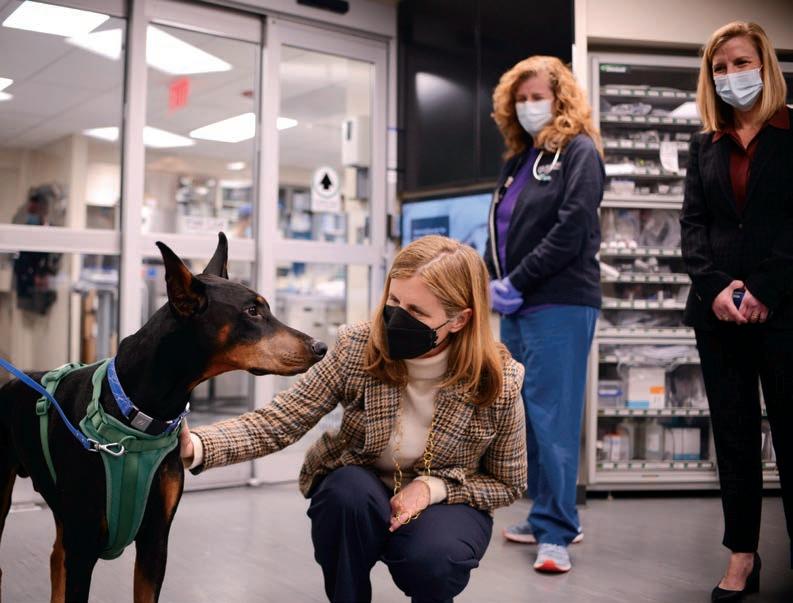
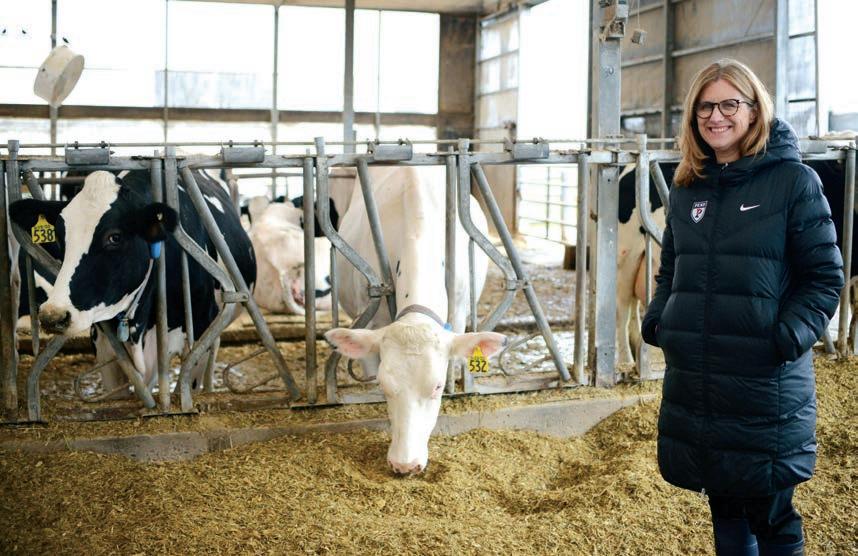

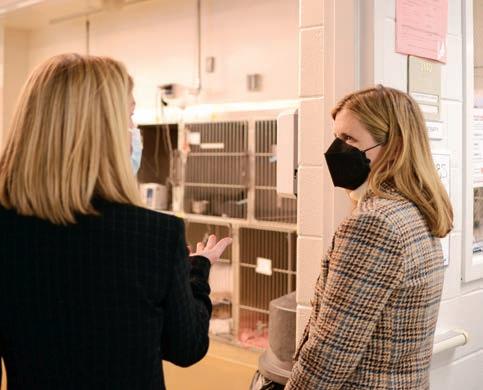

WWW.VET.UPENN.EDU/BELLWETHER 31
Left, President Magill toured the Marshak Dairy at New Bolton Center. Below, Magill met a group of students, staff, and faculty during a patient examination at the Equine Performance Evaluation Facility.
President Magill enjoyed a tour of Ryan Hospital led by Dr. Brady Beale (above right) and met a friendly Doberman in the Emergency Service (above). Magill also met with Dr. Elizabeth Woodward in the School’s newly refurbished anatomy lab (right).
PENNSYLVANIA FARM SHOW
In January, at the 107th Pennsylvania Farm Show, Penn Vet students, faculty, staff, and leadership met with public officials, farmers, 4-H students, and hundreds of other attendees. Their interactions at the weeklong celebration of agriculture underscore the crucial value that the region’s only veterinary school delivers, through our graduates, rigorous research, and livestock animal care.
The Farm Show’s theme — Rooted in Progress — essentially describes the strengths of Penn Vet, said Dean Andrew Hoffman, “Agriculture is all about interconnection: between human and animal health, between animal health and environmental health, and between the producers, consumers, and veterinarians who each have a role to play in a successful food system.”
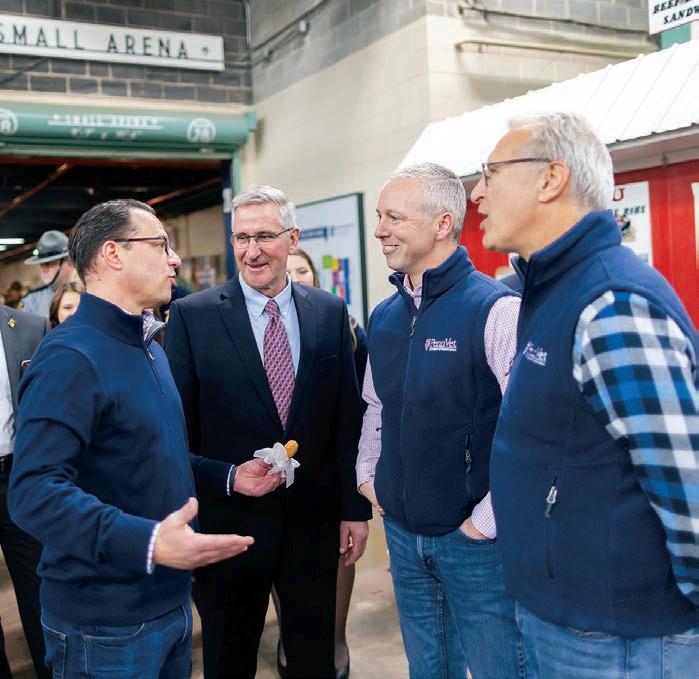
32 BELLWETHER SPRING/SUMMER 2023 SCHOOL NEWS
There are global problems that we are facing: climate change, the biodiversity crisis, infectious diseases. These types of challenges require us to come together.
Penn Vet
Dean
Andrew Hoffman
Penn Vet Dean Andrew Hoffman (far right) and Penn’s Director of Commonwealth Relations Mike Smith (second from right) spoke with then-governor-elect, now Gov. Josh Shapiro and Pennsylvania Secretary of Agriculture Russell Redding during Public Officials Day at the Farm Show.
p Farmers young and old from around the Commonwealth of Pennsylvania show off their prize animals at the state’s Farm Show, held in a million-square-foot complex in Harrisburg each winter. The School of Veterinary Medicine’s faculty and staff engaged with visitors and leaders throughout the event, underscoring the essential expertise and services that the School and its graduates contribute to the state
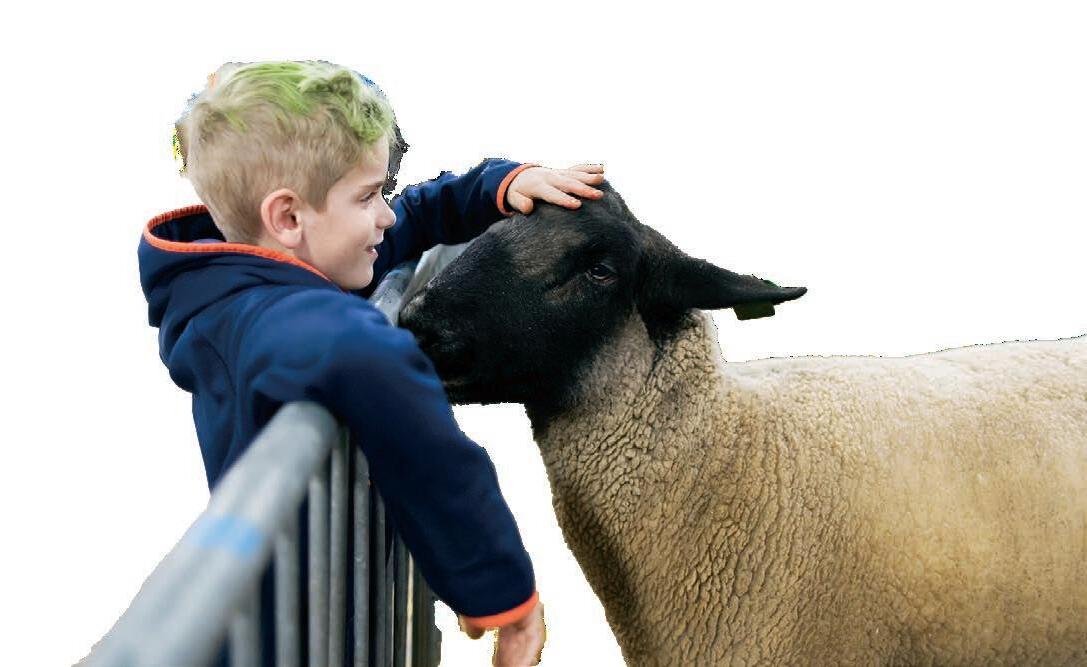
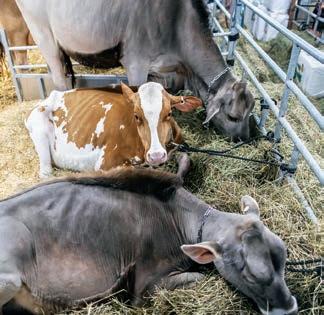
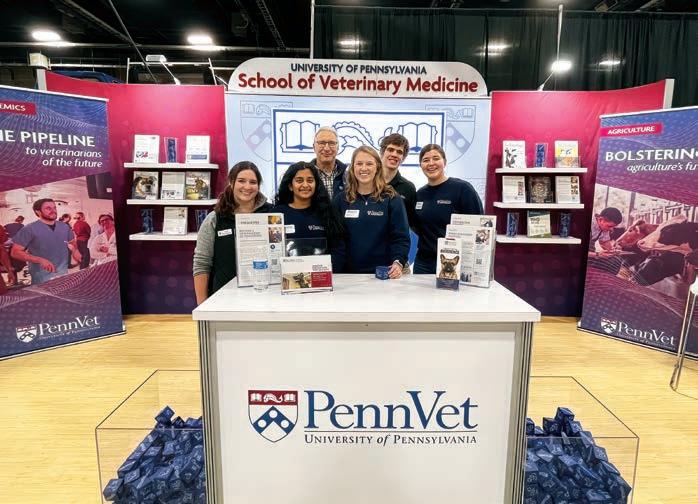

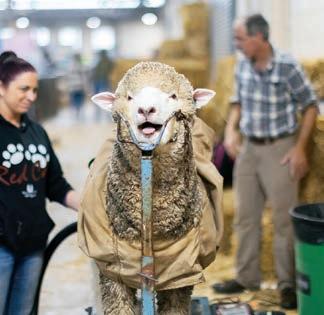 p Ann DiPastina, a member of Penn Vet’s Food Animal Field Service team, volunteered at the Farm Show’s Calving Corner, a popular
p Ann DiPastina, a member of Penn Vet’s Food Animal Field Service team, volunteered at the Farm Show’s Calving Corner, a popular
WWW.VET.UPENN.EDU/BELLWETHER 33
p Third-year students from the University of Pennsylvania’s School of Veterinary Medicine on opening day of the Farm Show, from left-to-right, Cara McNamara; Bucks County’s Alexis D’Souza; Lebanon County’s Kailey Werkheiser; Jake Nicastro; and Chester County’s Kathryn Lenker; with Andrew Hoffman, the Gilbert S. Kahn Dean of Veterinary Medicine.
EVENTS
MARTIN LUTHER KING, JR. DAY
In observance of the Martin Luther King, Jr. Day of Service, a vaccination and wellness clinic was held at Ryan Hospital. The student-run clinic provided free vaccinations to approximately 275 pets from the local community.
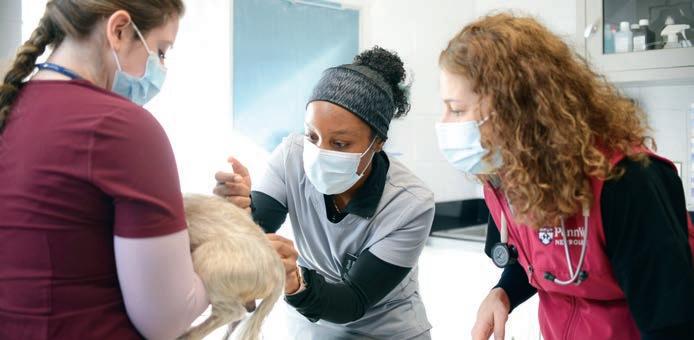
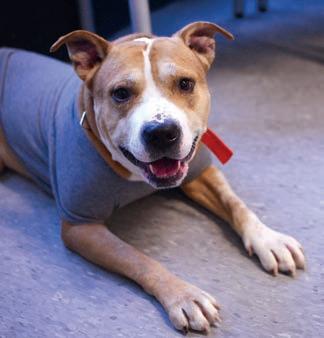
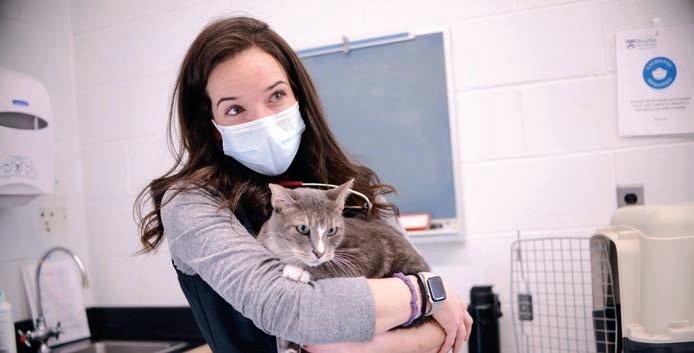
WHITE COAT CEREMONY
In November, the Class of 2024 received their white coats, marking the end of their lecture years and the beginning of clinical rotations. Left, Class President Kasey Barber welcomes the audience. Far right, Beatrice DeMarco shares her “Classmate’s Reflections.”
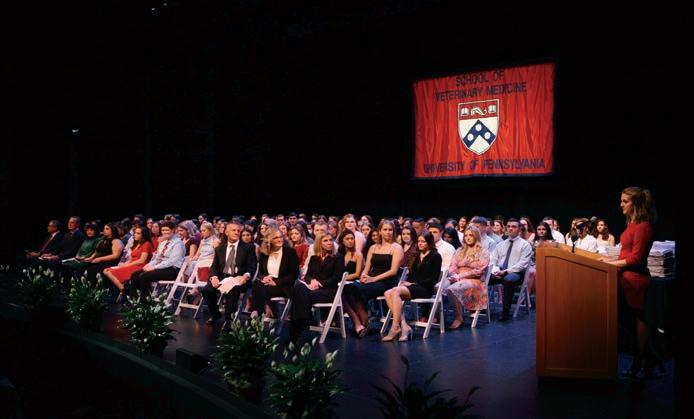
34 BELLWETHER SPRING/SUMMER 2023 SCHOOL NEWS
p STUDENT RESEARCH DAY
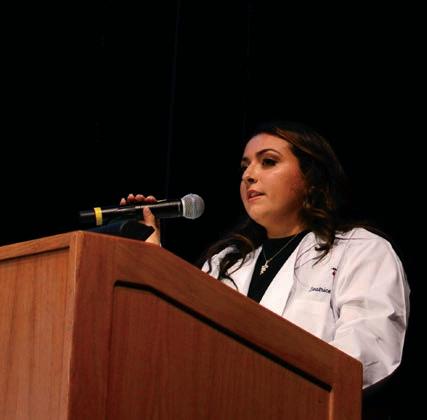
In March at the School’s annual Student Research Day, 35 VMD and VMD-PhD students shared their laboratory, clinical, or field studies research with attendees. Seven students gave oral presentations and 28 students presented posters. A panel of faculty judges selected outstanding abstracts to receive Richard O. Davies Awards for research excellence.

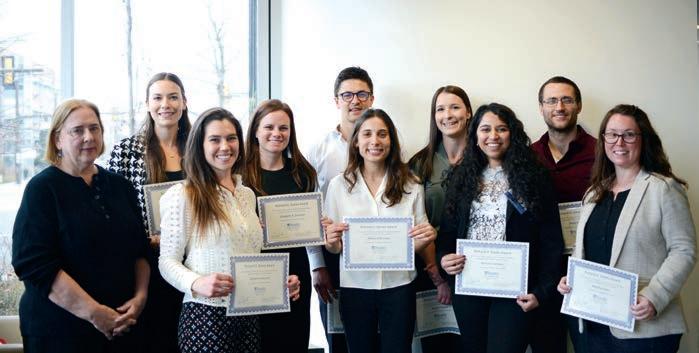
Keynote speaker Elaine A. Ostrander, PhD, from the National Human Genome Research Institute of the National Institutes of Health, delivered a fascinating address entitled “Genetics of Cancer, Morphology and Aging in Dogs.”
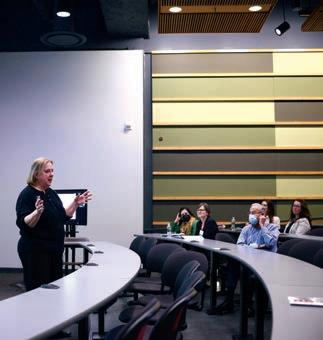
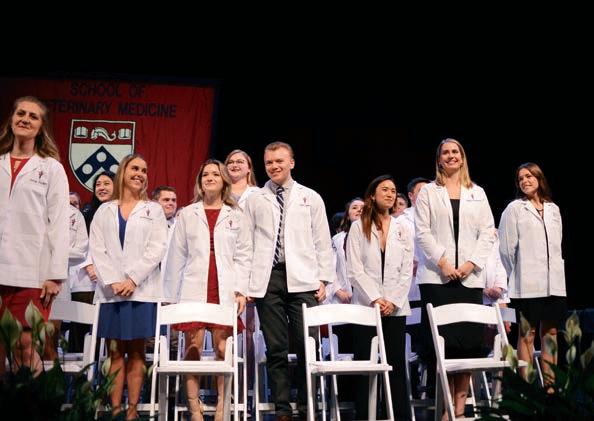
WWW.VET.UPENN.EDU/BELLWETHER 35 SCHOOL NEWS
FORGING COMMUNITY CONNECTION
Penn Vet Shelter Medicine and Community Engagement programming connects animal sciences, veterinary medicine, and the Philadelphia area. In addition to faculty- and staff-driven programs, the outreach programs offer opportunities for our students to engage with the community in collaboration with Penn’s Netter Center for Community Partnerships.
During their Shelter Medicine clinical rotation, Penn Vet students work with seventh- and eighth-grade students at Andrew Hamilton School, a University-Assisted School. Under faculty and staff guidance, our students create and deliver small group, interactive lessons to the younger students. The lessons encourage exploration of animal and veterinary sciences, as well as aspects of One Health and animal welfare.
Another community education program is Penn’s Educational Pipeline Program. In the spring, first- and second-year veterinary student coordinators deliver lessons to high school students on Penn Vet’s campus. The lessons facilitate interest in science and veterinary medicine, enabled students to explore animal sciences as a career path, and increase their knowledge about animals and animal welfare.
Finally, a capstone experience is offered as part of Penn Vet’s first-year curriculum. Students learn about best practices in community work and teaching and then deliver lessons to community schools.
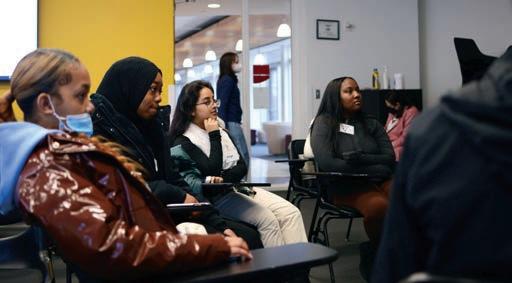
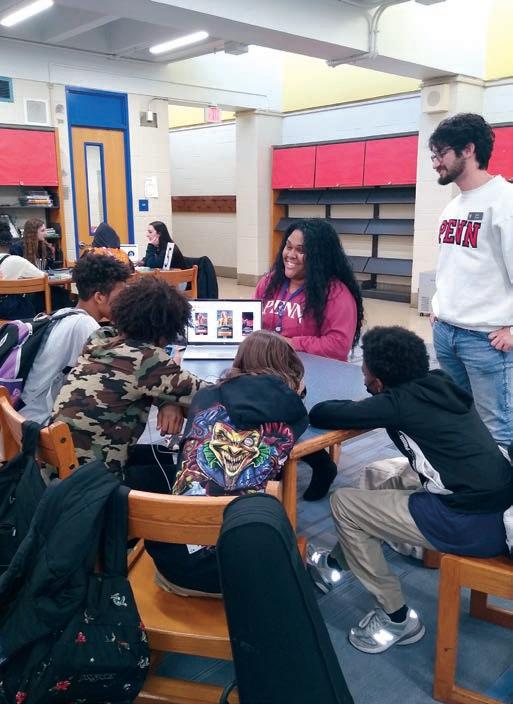

Exposing veterinary students to community engagement offers them vital experience and enhances their communication skills, all while expanding their perspectives of the communities they may someday serve and strengthening their ability to connect with clients and communities.
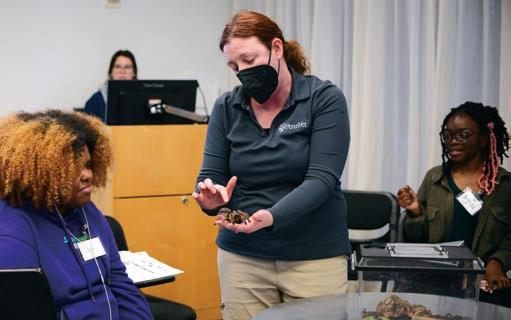
SCHOOL NEWS
36 BELLWETHER SPRING/SUMMER 2023
Bellwether’s Zoonosis Issue Wins Five Design Awards
Each year, the Circle of Excellence Awards (CASE) recognize higher education institutions whose communication staff members advance their organizations through innovative and creative ideas. CASE’s districts in the US and Canada offer awards programs to recognize and celebrate outstanding programs.
Bellwether’s Fall '21 | Winter '22 zoonotic disease issue competed among hundreds of CASE entries and received awards in the following four categories: Single Topic edition, Cover Design, Illustration, and Writing.
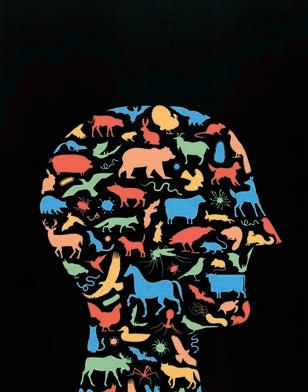
The issue also received Graphic Design USA’s prestigious American Graphic Design Award for overall magazine design.
FACULTY & STAFF UPDATES
Gustavo D. Aguirre, VMD, PhD, presented at International Congress Veterinary Vaccines in Varadero, Cuba on November 28, 2022, on the topic of “A Different Look at Viruses-Adeno Associated Viruses (AAV) as Gene Transfer Agents to Treat Inherited Retinal Diseases in Dogs and Humans.” He also presented at the American College of Veterinary Ophthalmologists annual meeting in Palm Springs, California, on October 29, 2022, with a keynote lecture titled, “From Dogs to DNA; from the Cage to the Bedside.” He was elected as a member to the Académie Vétérinaire de France, and he is the recent recipient of the 2023 Helen Keller Prize for Vision Research honoring scientific discovery and excellence.
Gary Althouse, DVM, PhD, MS, Diplomate ACTD, was recognized by the American Association of Swine Veterinarians (AASV) as the 2023 Outstanding Swine Academic of the Year at the AASV’s annual meeting in Aurora, Colorado. The award acknowledges an academic AASV member who has demonstrated excellence in teaching, research, and service to the swine veterinary profession.
"Generating new knowledge, solving problems in the field, and developing and mentoring our future colleagues are the pillars of my career,” said Althouse. “The AASV's recognition of these efforts reinforces my passion and commitment to the profession."
Tatyana Appelbaum, PhD, published Appelbaum T and Aguirre GD, “Identification of Circular RNAs Hosted by the RPGR ORF15 Genomic Locus,” RNA Biology, 2023, https://doi.org/10.1080/15476286.20 22.2159165.
Liz Arbittier, VMD, was appointed associate director for student affairs at New Bolton Center.
Matt Atherton, BVSc, PhD, began his role as assistant professor of immuno-oncology. His lab will focus on defining the prognostic and therapeutic role of T cells in hematologic neoplasms utilizing a multispecies comparative approach. He published Atherton MJ, Rotolo A, Haran KP, and Mason NJ, “Clinical and Serological Hallmarks of Cytokine Release Syndrome in a Canine B Cell Lymphoma Patient Treated with Autologous CAR-T Cells,” Frontiers in Veterinary Science, 2022, https://doi. org/10.3389/fvets.2022.824982.
WWW.VET.UPENN.EDU/BELLWETHER 37 FACULTY NEWS
bellwether
FALL/WINTER 2021-22 THE MAGAZINE OF PENN VET
The Zoonosis Issue
William A. Beltran, DVM, PhD, was elected to the Académie Vétérinaire de France, appointed the Corinne R. and Henry Bower Endowed Professor of Ophthalmology, and named a 2022 American Association for the Advancement of Science Fellow. He presented at FDA Veterinary Rounds on January 18, 2023, on the topic of “Nonclinical Assessment of Novel Retinal Therapies in Canine Models of Inherited Retinal Degeneration.” He published Aguirre GD and Beltran WA, “The Use of Canine Models to Develop Translational Gene Therapies for the Treatment of Six Forms of Inherited Retinal Degenerations,” Bulletin de l'Académie Vétérinaire de France, 2022, https://doi. org/10.1111%2Fj.14635224.2009.00694.x. He also published Cideciyan AV et al, “Photoreceptor Function and Structure in Autosomal Dominant Vitelliform Macular Dystrophy Caused by BEST1 Mutations,” Investigative Ophthalmology and Visual Science, 2022, https://doi. org/10.1167/iovs.63.13.12. He also published Xu L et al, “Distinct Phenotypic Consequences of Pathogenic Mutants Associated with Late-Onset Retinal Degeneration,” American Journal of Pathology, 2022, https://doi. org/10.1016/j.ajpath.2022.10.004. He also published Nikonov S et al, “Photochemical Restoration of Light Sensitivity in the Degenerated Canine Retina,” Pharmaceutics, 2022, https://doi.org/10.3390/ pharmaceutics14122711. He also published Cideciyan AV et al, “Photoreceptor Function and Structure in Retinal Degenerations
Caused by Biallelic BEST1 Mutations,” Vision Research, 2023, https://doi.org/10.1016/j. visres.2022.108157.
Leonardo Brito, DVM, PhD, DACT, was an invited expert at the roundtable discussion “The Future of Semen Analysis” during the annual meeting of the National Association of Animal Breeders. He was an invited speaker at the Select Breeders Service network annual meeting and presented on “Quality Assurance for Semen Processing Centers” and “Antibiotics in Equine Frozen Semen.” He also presented the guest lecture “Pathogenesis of Sperm Defects and Effects on Fertility” for the graduate program at the University of Murcia, Spain. He published Brito LF, Loomis PR, Klohonatz KM, and Althouse GC, “Penicillin and Amikacin Mixture Has Bactericidal Activity Equivalent to Gentamicin, Tylosin, Lincomycin and Spectinomycin Mixture in Equine Frozen Semen,” Reproduction in Domestic Animals, 2023, https://doi.org/10.1111/ rda.14294.
Julie Engiles, VMD, DACVP, gave the LADIS keynote address, entitled “Radiologic-Pathologic Correlation: A Village-Based Approach to Accurate Diagnostic Interpretations,” at the American College of Veterinary Radiology annual conference in Reno, in October 2022. She also spoke at the annual American College of Veterinary Pathologist Meeting held in Boston, in November 2022, presenting a research project entitled “Gross, Histopathologic, Microbiologic and Radiologic
Characterization of Lesions Associated with Clinical Lameness in a Cohort of Group-Housed Sows Euthanized for Lameness.” She also published Engiles JB, Fanzone N, Wulster K, and Pierdon M, “Gross, Histopathologic, Microbiologic and Radiologic Characterization of Lesions Associated with Clinical Lameness in a Cohort of GroupHoused Sows Euthanized for Lameness,” Veterinary Pathology, 2022, https://doi. org/10.1177/03009858221114470.
Samantha “Sammi” Fromm, the lead clinical pathology lab technician, received a Penn 2023 Models of Excellence: Pillars of Excellence Award. This award recognizes Penn staff members with superior sustained service, exemplary responsiveness and professional behavior, exceptional resourcefulness, and who contribute to a positive collaborative work environment.
Ronald Harty, PhD, published Liang J, Djurkovic MA, Shtanko O, and Harty RN, “Chaperone-Assisted Selective Autophagy Targets
Filovirus VP40 as a Client and Restricts Egress of Virus Particles,” Proceedings of the National Academy of Sciences of the United States of America, 2023, https:// doi.org/10.1073/pnas.2210690120. His project collaborators include the BLS-4 Lab at Texas Biomedical Research Institute. He also published Liang J, Djurkovic MA, Shtanko O, and Harty RN, “Chaperoning the Driver of Filovirus Egress to a Dead End,” Autophagy, 2023, https://doi.org/10.1080/15548 627.2023.2178781.
38 BELLWETHER SPRING/SUMMER 2023 FACULTY NEWS
p Nicola Mason, BVetMed, PhD, was interviewed by Anderson Cooper for 60 Minutes about her role in leading clinical trials evaluating a novel Listeria-based vaccine to treat pet dogs with osteosarcoma. The segment aired November 27, 2022.
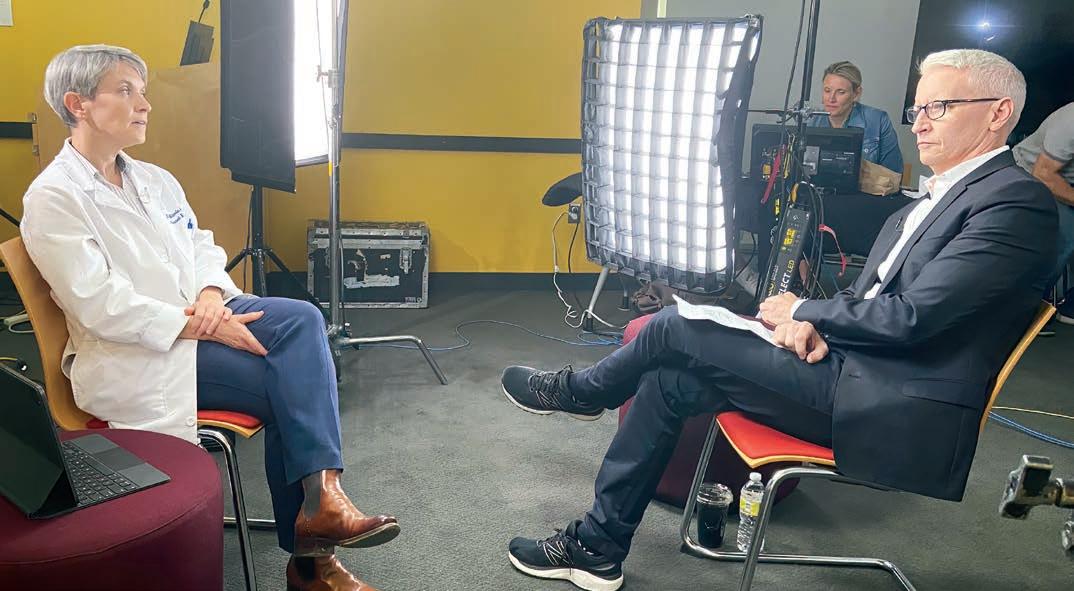
p Dean Andrew Hoffman hosted a faculty reception on October 27, 2022, in recognition and celebration of faculty appointments, promotions, and endowed chair appointments from July 1, 2021 to June 30, 2022.
Erica Reineke, VMD , received the Zoetis Award for Veterinary Research Excellence at the 2022 Faculty Research Retreat. Presented by Mark Oyama, DVM, MSCE, DACVIM, the award recognizes outstanding achievement and dedication in the field of veterinary medicine.

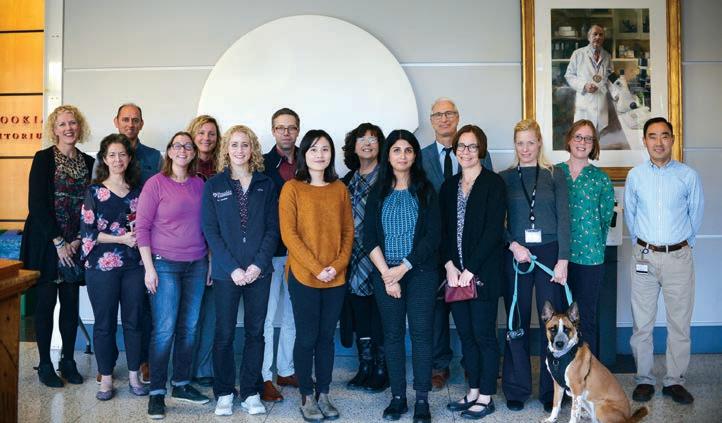
Katrin Hinrichs, DVM, PhD, DACT, was inducted into the Equine Research Hall of Fame at the University of Kentucky in November 2022.
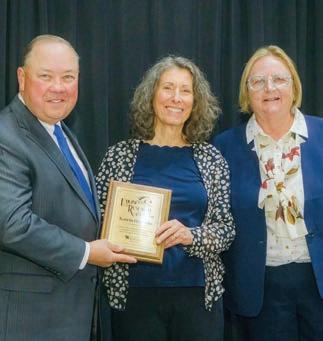
WWW.VET.UPENN.EDU/BELLWETHER 39 FACULTY NEWS
FACULTY & STAFF UPDATES
Keiko Miyadera, DVM, PhD, gave a talk on “Canine Ocular Genetics and Therapy” at the Gifu Pharmaceutical University in Gifu, Japan in November 2022. She also spoke as a panelist at a ciliopathy symposium at the Japanese Pharmacological Society Annual Meeting in Yokohama, Japan, in December 2022.
Lisa Murphy, VMD, DABT, was promoted to professor of toxicology.
Ali Nabavizadeh, PhD, co-published An Illustrated Guide to Dinosaur Feeding Biology (Johns Hopkins University Press, 2023) with David B. Weishampel; available at https://www.press.jhu.edu/books/ title/11476/illustrated-guidedinosaur-feeding-biology.
Cynthia Otto, DVM, PhD, DACVECC, DACVSMR, published Kane SA, Lee YE, Essler JL, Mallikarjun A, Preti G, Plymouth VL, Verta A, DeAngelo A, and Otto CM, “Canine Discrimination of Ovarian Cancer through Volatile Organic Compounds,” Talanta, 2022, https://doi.org/10.1016/j. talanta.2022.123729. She also published Eyre AW et al, “Genome Scanning of Behavioral Selection in a Canine Olfactory Detection Breeding Cohort,” Scientific Reports, 2022, https://doi. org/10.1038/s41598-022-18698-4. She also published Loonsk HL et al, “Retention and Future Involvement in the American Kennel Club Junior Showmanship Program, a Youth Dog Breed Conformation Competition,” Frontiers in Veterinary Science, 2022, https:// doi.org/10.3389/fvets.2022.871914. She also published Gokool VA et al, “The Use of Biological Sensors and
Instrumental Analysis to Discriminate COVID-19 Odor Signatures,” Biosensors, 2022, https://doi.org/10.3390/ bios12111003. She also published Ramos MT and Otto CM, “Canine Mobility Maintenance and Promotion of a Healthy Lifestyle,” Veterinary Clinics of North America: Small Animal Practice, 2022, https://doi.org/10.1016/j. cvsm.2022.03.001. She also published Meller S et al, “Expert Considerations and Consensus for Using Dogs to Detect Human SARS-CoV-2-Infections,” Frontiers in Medicine, 2022, https://doi. org/10.3389/fmed.2022.1015620. She presented “AAHA Working Dog Guidelines” at the AVMA Convention in Philadelphia, on August 1, 2022, and assisted at a roundtable on “Working Dog Guidelines.” She presented at the
In January, the American College of Theriogenologists (ACT) Certifying Examination Committee held its annual retreat at the Allam House on New Bolton Center's campus. A member of the examination committee, Patricia Sertich, associate professorclinician educator in reproduction and current ACT secretary, hosted the group. Guests included, pictured left to right, Jacobo Rodriguez (Colorado), Sertich, Ahmed Tibary (Washington State University), Erin Runcan (Ohio State University), committee Chairperson Joann Randall (Virginia), Soon Hon Cheong (Cornell University), and Rejean Lefebvre (University of Montreal).

40 BELLWETHER SPRING/SUMMER 2023 FACULTY NEWS
Italian Companion Animal Veterinary Association Sports Medicine webinar on “Working Dogs: Preventing Dehydration in Extreme Environmental Conditions” and “Substances That Might Impair Olfaction and Performance in Working Dogs: Diagnosing and Decision Making.” She also presented at the American Animal Hospital Association Conference in Nashville, on September 16, 2022, on “AAHA Working Dog Guidelines.” She is affiliated with Penn Vet Working Dog Center.
Meghann Pierdon, VMD, is the point person for the Certified Swine Sample Collection (CSSC) training program, which will introduce approved national and Pennsylvania Bureau of Animal Health CSSC materials to category II accredited veterinarians practicing in Pennsylvania.
Ana Ripolles-Garcia, PhD, published Ripolles-Garcia A, Chen Y, Sato Y, Gray A, Ying GS, Aguirre GD, and Beltran WA, “Retinal Vascular Plexuses Are Unequally Affected in Canine Inherited Retinal Degenerations,” Investigative Ophthalmology and Visual Science, 2022, https://doi.org/10.1167/ iovs.63.12.22. She also published Ripolles-Garcia A, Dolgova N, Phillips MJ, Savina S, Ludwig AL, Stuedemann SA, Nlebedum U, Wolfe JH, Garden OA, Maminishkis A, Amaral J, Bharti K, Gamm DM, Aguirre GD, and Beltran WA, “Systemic Immunosuppression Promotes Survival and Integration
Thomas Schaer, VMD, director of the Comparative Orthopedic Research Laboratory at New Bolton Center, received the ACVS Merit Award from the American College of Veterinary Surgeons at their annual meeting in October 2022. The award recognizes non-ACVS Diplomates who have made major contributions to the development of methods, techniques, devices, and educational aspects of veterinary surgery.
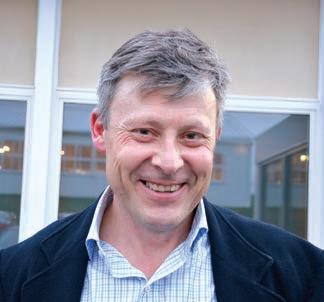
of Subretinally Implanted Human ESC-Derived Photoreceptor Precursors in Dogs,” Stem Cell Reports, 2022, https://doi. org/10.1016/j.stemcr.2022.06.009.
Charles Vite, DVM, ACVIM (Neurology), director of the National Referral Center for Animal Models of Human Genetic Diseases, announced that the center will close in December 2023. Active since 1974, the center has focused on the discovery and characterization of naturally occurring genetic diseases in dogs and cats, and the development of
advanced therapies (small molecule, gene therapy, stem cell therapy) for these diseases which benefit both veterinary and human patients. The center’s faculty, staff, and students have published more than one thousand papers on genetic characterization, disease pathogenesis, and therapy. These studies aided in the development of precise diagnostic tests used to recommend informed breeding of carrier and normal dogs to prevent disease in veterinary patients, and in the development of novel therapies for treating diseases that previously had no cure. His project collaborators over the years have been Dr. Margret Casal, Dr. John Wolfe, Dr. Urs Giger, Dr. Mark Haskins, Dr. Paula Henthorn, Dr. Peter Felsburg, and Dr. Donald Patterson.
Susan Volk, VMD, PhD, was awarded the first Penn Vet Cancer Center Transformative Research Award for “Harnessing the TumorRestrictive Properties of Type III Collagen in Feline Mammary Tumors: Development of Prognostic Markers and Targeted Therapies for Improved Outcomes.” Her project collaborators are Dr. Amy Durham, and Dr. Karin Sorenmo.
WWW.VET.UPENN.EDU/BELLWETHER 41
STUDENT NEWS
Estefania Benavides, V’25 , is the first veterinary student accepted into the newly established dual-degree program for a master’s in translational research at the Institute for Translational Medicine and Therapeutics in the Perelman School of Medicine. She will be exploring the use of NfL and CXCL13 to understand the pathophysiology and the progression of meningoencephalitis of unknown origin (MUO) in dogs. She was also awarded a CTSA TL1 grant for support through the program. Her collaborators are Dr. Molly Church and Dr. Jenni Punt.
Dana Bubka, V’25 , participated in the student research presentation competition at the 94th Annual Northeastern Conference on Avian Diseases (NECAD) held at Penn State on September 14, 2022. Her presentation focused on quantifying the impacts of common bedbug infestations on laying hen health and welfare. She won first place in the competition and received an award certificate for Best Graduate or Veterinary Student Presentation. She collaborated with Dr. Meghann Pierdon and Dr. Kris Smith.
Casey Madeline Rubin, V’26 , published “Reproductive Veterinarians: The Long-Term Solution for Reducing Pressure on Companion Animal Shelters” in DVM360 in January 2023. Her article can be found at https:// tinyurl.com/PennVetDVM.
Abigail Seeley, V’24 , was invited to speak to the senior capstone class in the International Agriculture program at Penn State on her experiences working in the domestic and foreign animal agriculture industry and what considerations regarding agriculture students can have while trying to be good global citizens. She collaborated with Noel Habashy, PhD (Penn State).
Fourth-year veterinary student Alex Valle is one of four students who were named recipients of the Foundation for the Horse’s 2022 Coyote Rock Ranch Veterinary Scholarship at the American Association of Equine Practitioners (AAEP) annual convention in San Antonio, Texas. The scholarship is awarded to fourth-year veterinary students who are active AAEP student members and have a demonstrable interest in equine medicine.
Valle, who aspires to equine ambulatory practice, will enter a rotating ambulatory and surgery internship upon graduation with potential pursuit of a sports medicine and rehabilitation residency in the future. He has externed at many leading equine practices across the United States and his research study, “Effect of video angle on detection of induced front limb lameness in horses,” received a first-place Fear Free research grant.

42 BELLWETHER SPRING/SUMMER 2023 STUDENT NEWS
ALEX VALLE, V’23, AWARDED $75,000 COYOTE ROCK RANCH SCHOLARSHIP
the
traveling flag
It started with a wedding in Philadelphia, then there was another one in Middleton, Connecticut, and eventually the Class of 2019’s flag traveled across the Atlantic Ocean last summer, making its way from one celebration to another. Overall, a friend group of V’19 alumni coordinated six flag photoshoots in four states and two continents at the weddings of classmates.
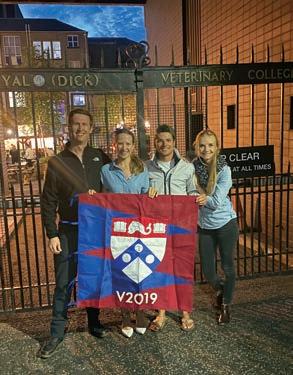
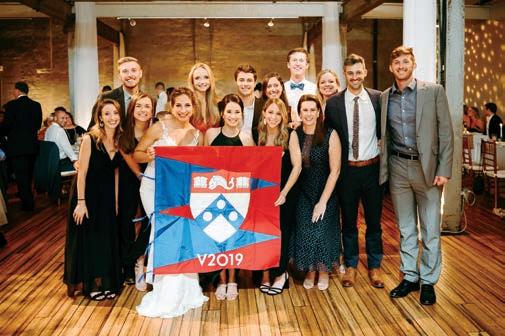
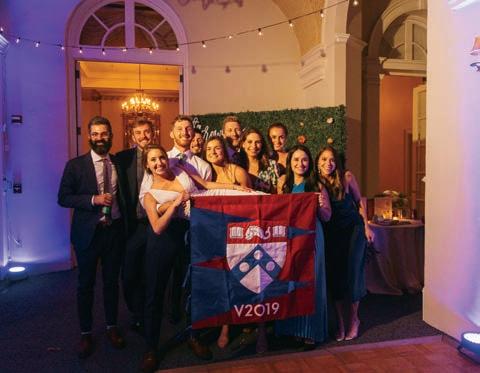
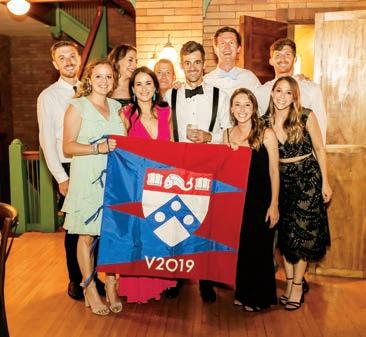
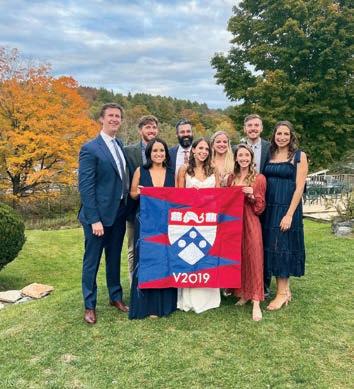
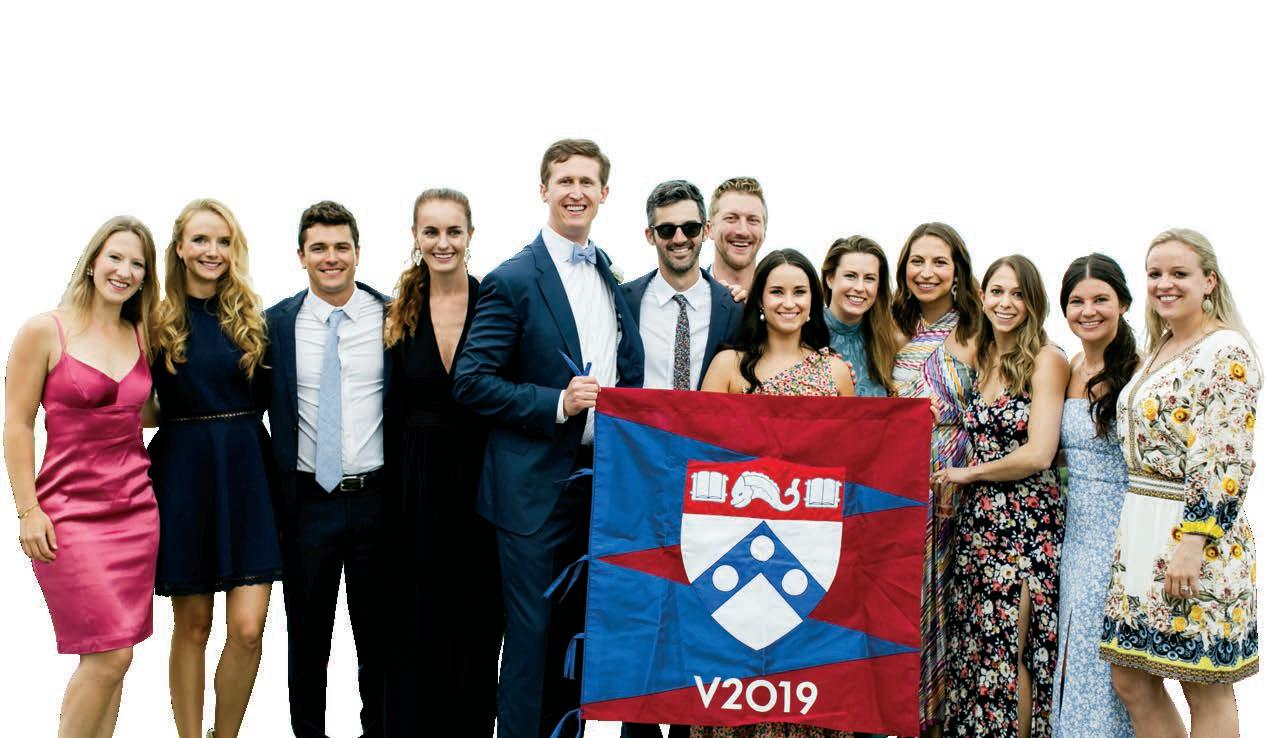
WWW.VET.UPENN.EDU/BELLWETHER 43 ALUMNI NEWS
WESTBROOK, CT
MIDDLETON, CT
PHILADELPHIA
SCOTLAND
VERMONT
CHICAGO
CLASS NOTES
1970s
Barry England, V’77 , received the Agricultural Community Excellence Award from the Blair County Chamber of Commerce. The award recognizes the many facets that make agriculture a primary industry in Blair County, Pennsylvania.
1980s
Noah Cohen, V’83 , received a Boehringer Ingelheim Animal Health 2022 Advancement in Equine Research Awards during the 68th Annual American Association of Equine Practitioners Convention in San Antonio. The recipients were selected based on their research proposals centered on equine infectious respiratory disease and equine asthma syndrome.
1990s
Christine Kreuder Johnson, V’94 , was selected by the US Department of State as one of seven distinguished scientists to serve as science envoys, who help the federal government and the scientific community leverage opportunities for international science and technology cooperation.
Jennifer Shickler, V’96 , opened a second small animal clinic, West Concord Animal Clinic, in Massachusetts.
2000s
Aliza J. Simeone, V’01 , received the 2022 Pennsylvania Veterinary Medical Association Public Service Award of Merit for her instrumental role in protecting Pennsylvania from HPAI, even before the outbreak started.
Szczepan Baran, V’02 , is now the chief scientific officer at VeriSIM Life.
Laura Johnson, V’05 , opened a startup small animal general practice, Cypress Veterinary Clinic, in Kennett Square, Pennsylvania.
2010s
Kathryn Bach, V’13 , was appointed interim director of the Cornell University CVM Teaching Dairy, which provides educational resources for students as well as milk for Cornell and three other area colleges.
IN REMEMBRANCE
1950s
John Mohler, V’54 Rockville, MD February 14, 2023
Richard R. Ryan, V’56 Ocean City, NJ March 1, 2023
Blair English, V’57 York, PA
June 19, 2022
Virginia Flynn, V’57 Charlottesville, VA December 20, 2022
Don Patton, V’57 York, PA
September 25, 2022
Roger Smith, V’57 Bonita Springs, FL November 2022
A. Cleveland Brown, V’59 Burtonsville, MD February 9, 2023
1960s
Jack Bregman, V’66, passed away on November 4, 2022. He established the first of the Bregman Veterinary Group hospitals in 1970 in the Midwood Section of Brooklyn which has since expanded to more locations in Brooklyn, Long Island and Orlando, FL. An avid alumnus and booster of the school, Bregman served as a past president of the alumni society and received the Alumni Award of Merit in 1996.
44 BELLWETHER SPRING/SUMMER 2023 ALUMNI NEWS
1960s
Stanley Sigel, V’62
January 15, 2023
Barton Rohrbach, V’64
Knoxville, TN
December 10, 2022
Douglas Obeck, V’65
San Antonio, TX
October 25, 2022
Thomas Dick, V’66
Chincoteague Island, VA
July 30, 2022
John Hansell, V’68
Canonsburg, PA
August 5, 2022.
1970s
Edward Schwartzman, V’71
Santa Rosa, CA
October 21, 2022
Nancy Craig, V’77
Petaluma, CA
September 15, 2022
Diane Camilleri, V’78
Foley, Alabama
September 18, 2022
1980s
Jocelyn Bezner, V'86
Wilmington, DE
September 17, 2022
1990s
Valerie Heartsfield, V’96
Philadelphia, PA
October 28, 2022
Margaret Mullin, V’96
March 11, 2023
DORIS SELL EMERSON, V’54
Doris Sell Emerson, V’54, passed away on January 19, 2023. She was 96.
SEND US YOUR NEWS
Penn Vet graduates achieve remarkable successes every day. Whether you have a new address, are moving forward in your career, announcing an addition to the family or honoring the life of a fellow alumnus, Alumni Relations wants to hear about it.
Please share your news! Visit the Alumni page of the Penn Vet website or email your news to the alumni office at grovessh@ vet.upenn.edu. We may edit submissions due to space considerations.
She received her undergraduate degree from Temple University, and her veterinary degree from the University of Pennsylvania, where she graduated first in her class, summa cum laude, and one of two women in the Class of 1954.
Doris and her husband, John G. Emerson, VMD, established the Buckingham Veterinary Clinic in Buckingham, PA, in February 1957, where she practiced for 30 years before retirement. After retiring from veterinary medicine she worked as a bank teller and as a successful realtor.
Emerson’s surviving family includes her husband, John; daughters Linda Emerson, Holly Emerson Wohlers, and Mardi Emerson Rumin.
Memorial gifts can be made to the University of Pennsylvania Veterinary Student Scholarship Fund at https://www.vet.upenn. edu/giving.
WWW.VET.UPENN.EDU/BELLWETHER 45
IN MEMORIAM
HERBERT MOELIS
Herbert Moelis, W’53, a past member of both the Penn Vet Board of Advisors and Penn Libraries Board of Advisors, died on October 6, 2022, after a battle with Parkinson’s disease. He was 91.
Born in Brooklyn, New York, he graduated from the Wharton School at Penn in 1953 and went on to earn a law degree from New York University in 1956, along with his LLM degree specializing in tax law. He was also a certified public accountant.
Moelis started his business career on Wall Street and became an entrepreneur and CEO of several companies, one of which was Equity Leasing Corp., which he took public. He embarked upon a second career with his wife, Ellen, in 1986 when they purchased a farm in Delaware and started a Thoroughbred horse breeding and racing operation, calling it Candyland Farm.
In 1990, Moelis founded the Thoroughbred Charities of America (TCA) with his wife and with American sportswoman Allaire du Pont. It was one of the first and most successful fundraising charities supporting
nonprofit Thoroughbred horse rescue groups throughout the country, working toward ending the slaughter of Thoroughbreds in the United States and supporting backstretch employees who work with horses.
At Penn, Moelis served six years on the Penn Libraries Board of Advisors, as well as ten years on the Penn Vet Board of Advisors. He was the recipient of the Alumni Award of Merit in 2010. He sponsored Penn scholarships for four students in perpetuity.
In 2017, in honor of his 85th birthday, his family created the Moelis Family Grand Reading Room in the Van Pelt-Dietrich Library Center, named for both Ellen and Herbert Moelis. Moelis was vice president of the board at Delaware Park Racing and president of the Board of Directors of TCA for over twenty years. He also founded and served as chair of the Board of Trustees of Thoroughbred Education and Research Foundation (TERF), supporting medical research for horses and providing scholarships to veterinary students.
He is survived by his wife, Ellen; sons, Ron, C’78, W’78 (Kerry); Ken, W’80, WG’81, a Penn Trustee (Julie, W’81); daughter, Cindy, W’82 (Bob); grandchildren Jordan, W’09, WG’10 (Jordan); Andrew, C’10 (Rosa), Cory, W’11, WG’18, Maddy, W’12 (Kevin), Stephanie (Joel), Adam, W’14, Kate, C’16, Claire, Paige, W’19, and Alexander; great-grandchildren Milo and Henry; brother, Jay (Barbara); and sisters-in-law Marilyn Moelis, Ann Mac Dougall, and Ida Farriella (Nick); and many nieces and nephews.
IN MEMORIAM
46 BELLWETHER SPRING/SUMMER 2023
DR. BARBARA GRANDSTAFF
Dr. Barbara Grandstaff, passed away on Monday, February 6, 2023. She served as the organizer of Penn Vet's Gross Anatomy course for more than 20 years. Grandstaff was awarded her PhD from the University of Pennsylvania, and her MS in geological and geophysical sciences from Princeton University; where she was among the first female cohorts to attend Princeton, in the early 1970s. She had a venerable and passionate enthusiasm for paleontology, and her love of dinosaurs and fossils dated back to her childhood.
The New York Times profiled Grandstaff’s curatorial role developing the exhibit “New Jersey and the Great Ice Age” at the New Jersey State Museum in 1999. Two decades later, a central New Jersey newspaper interviewed Grandstaff for her 1986 role excavating a New Jersey cretaceous era fossil site. “The site is incredibly interesting,” she said at the time. “I cried hurray because I found a mammal’s tooth. It was the first time anyone found a mammal’s tooth from the cretaceous period.”
Grandstaff was an esteemed member of the Penn Vet family. Her death is a monumental loss not only for the School, but also for her former colleagues who knew her well.
“I could always count on Barbara for advice on the teaching of Anatomy. She knew the material to a depth that was outstanding,” said Director of Veterinary Gross Anatomy Paul Orsini, DVM, DACVS, who worked with Grandstaff for 34 years. “Barbara was one of the most devoted teachers I have ever worked with. Her dedication to teaching our students was unbelievable, always being available to students at any time of day.”
“Barbara was authentic, witty, and passionate about her work. Deeply caring about her students, she regularly put in a tremendous amount of time and heart into her teaching, said Clinical Associate

Professor Elizabeth Woodward, PhD. “In addition to her dedication to her work at Penn Vet, she was devoted to her husband David, daughter Cathy, and her cats. Her absence leaves a painful void that is only comforted by our many fond memories of her.”
“She touched every student in the School,” recalled Emeritus Professor of Anatomy Peter Dodson, PhD. “And she did so for decades since the mid-1980s.”
“Barbara was always an advocate for the students. She had a generous spirit, although she did not suffer fools gladly,” recollected longtime member of the Anatomy lab team Adelaide Paul. “There is a huge hole in the consciousness and soul of our little anatomy group.”
“I never expected to be a part of history,” Grandstaff told a newspaper reporter in 2020. “I’ve been very lucky at being at the right place at the right time.”
Grandstaff’s surviving family includes her husband, David E. Grandstaff, PhD; daughter Catherine; mother Esther Smith; brother Bruce Smith; and sister Cheryl Stahersk.
WWW.VET.UPENN.EDU/BELLWETHER 47
IN MEMORIAM
Grandstaff, pictured with then Class President Noah Shulman, V'21, was awarded the Class of 2021 Laboratory Teaching Award.
48 BELLWETHER SPRING/SUMMER 2023 PENN VET NEW BOLTON CENTER @NEWBOLTONCENTER @NEWBOLTONCENTER NEW BOLTON CENTER Follow Us WWW.VET.UPENN.EDU PENN VET @PENNVET @PENNVETSCHOOL @PENNVET PENN VET Last CALENDAR 2023 MAY 9 FIRST TUESDAY LECTURE (virtual) Joint Health 12-13 ALUMNI + REUNION WEEKEND Penn Vet 15 V’23 COMMENCEMENT Philadelphia Campus JUNE 15 ALUMNI RECEPTION AT ACVIM Philadelphia JULY 14 ALUMNI RECEPTION AT AVMA Denver SEPTEMBER 28-29 PENN ANNUAL CONFERENCE
9 ALUMNI RECEPTION AT ACVC Atlantic City 29 ALUMNI RECEPTION DURING ACVP Chicago, IL DECEMBER 3 ALUMNI RECEPTION DURING AAEP San Diego, CA
OCTOBER
Last
Happy Patient
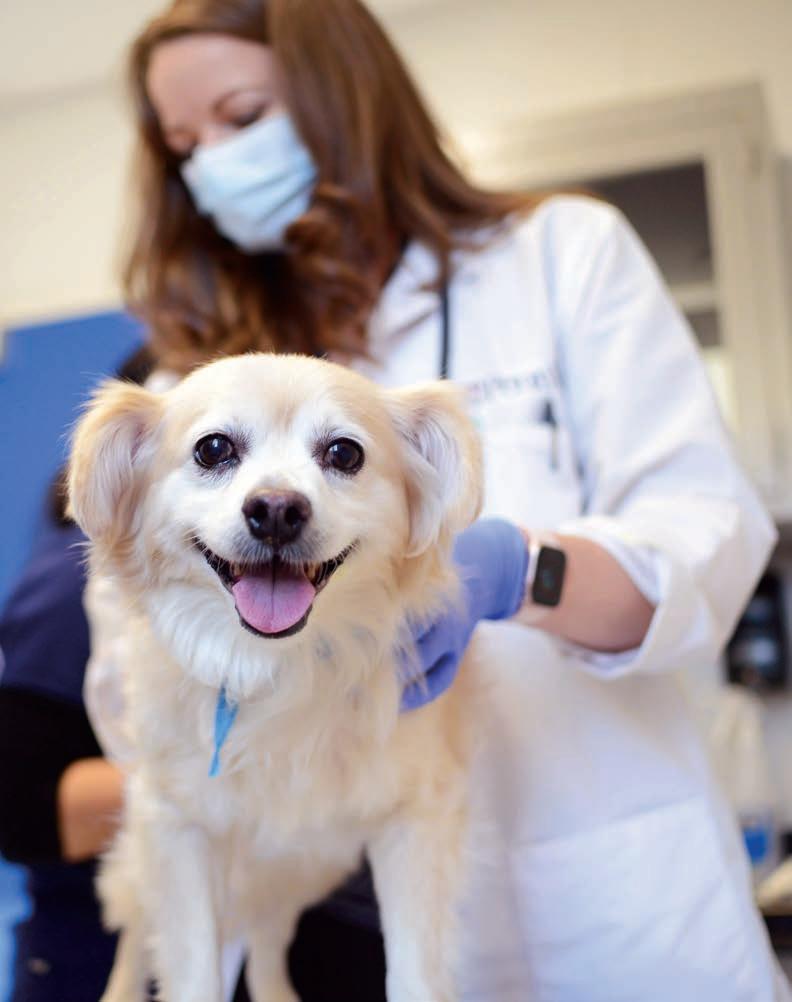
Dr. Anna Massie, assistant professor of Orthopedic Surgery, helps examine this adorable pup during Penn Vet’s Martin Luther King, Jr. Day of Service vaccination and wellness clinic, organized by the Shelter Medicine Club.
In its 14th year, Penn Vet’s flagship community event reflects our ongoing commitment to the Philadelphia community and to supporting animal well-being. The clinic offers accessible veterinary services to our local communities. The clinic not only educates owners on the well-being and care of their pets, but also contributes to the overall reduction of many preventable infectious diseases, including rabies.
WWW.VET.UPENN.EDU/BELLWETHER 49
Word
3800 Spruce Street, Suite 151E
Philadelphia, PA 19104-6044
United Way of Greater Phila. & So. NJ: #50178
Our mission
next generation of leaders to advance healthcare outcomes and access, ensure global health, bolster sustainable agriculture, create and support interdisciplinary career paths, and foster diversity, equity, and inclusion in the profession.
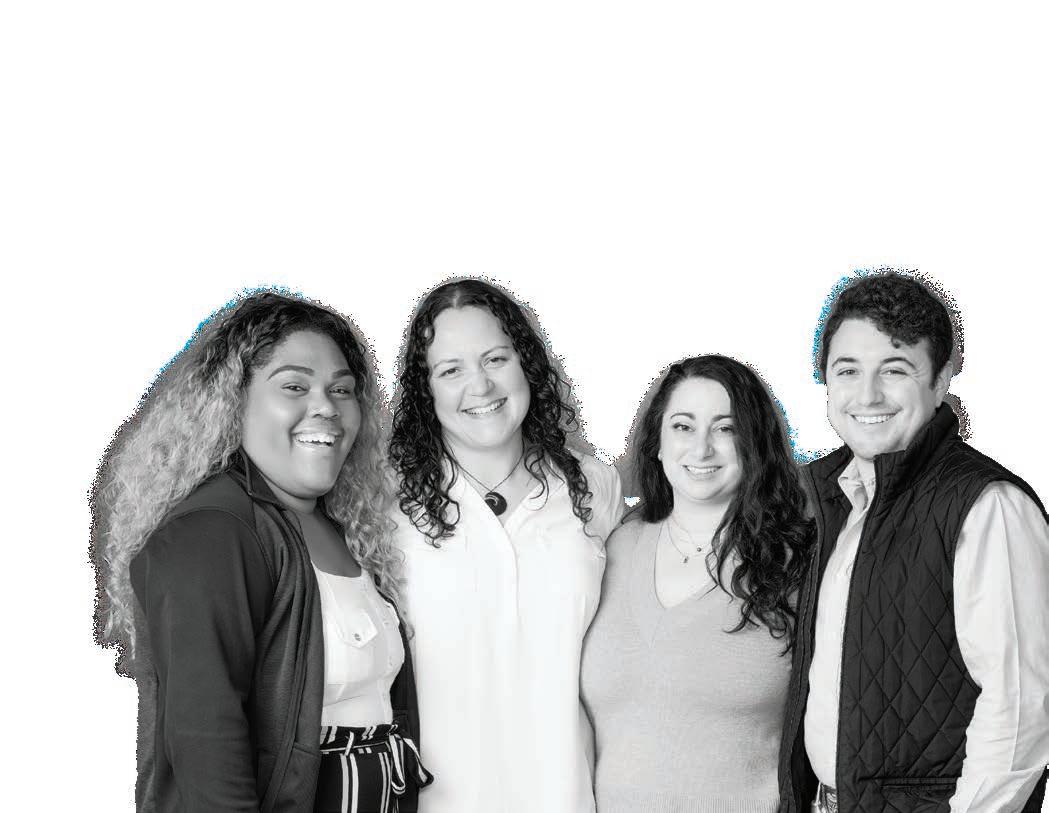
Nonprofit Organization U.S. Postage PAID Bellmawr, NJ Permit No. 1485



































 by Sacha Adorno
by Sacha Adorno







 Dr. Modesty Burleson, V’07 Spy Coast Farm
Dr. Modesty Burleson, V’07 Spy Coast Farm























 p Ann DiPastina, a member of Penn Vet’s Food Animal Field Service team, volunteered at the Farm Show’s Calving Corner, a popular
p Ann DiPastina, a member of Penn Vet’s Food Animal Field Service team, volunteered at the Farm Show’s Calving Corner, a popular





























